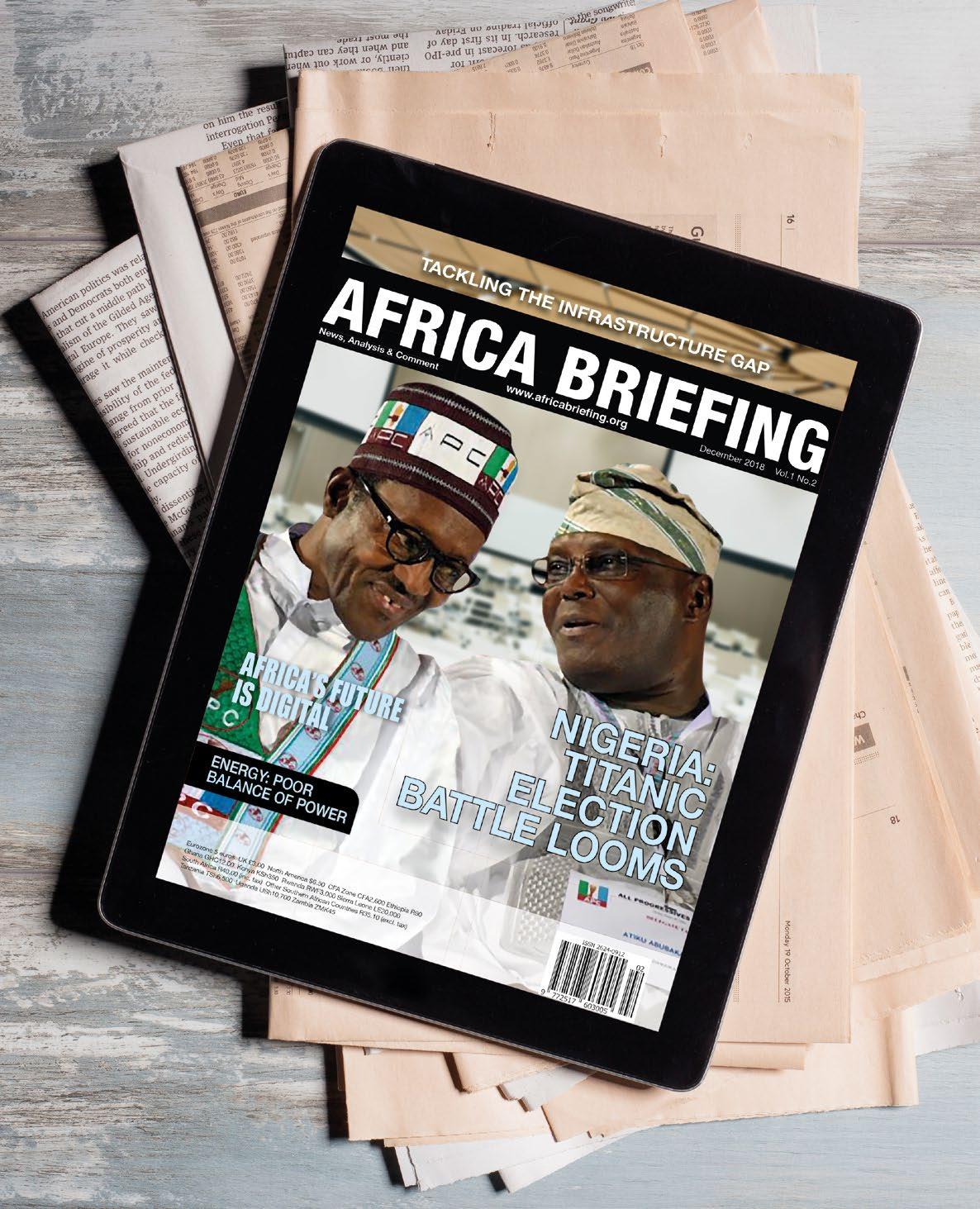












IN a detailed analysis by David McNair of the Carnegie Endowment for International Peace on pages 14-17 of this edition, he underscores a demographic transformation poised to redefine the futures of Africa and Europe. By 2050, Africa will add 796 million people to its workforce, while Europe’s working-age population will decline by 156 million. This demographic shift presents profound implications for both continents, influencing migration patterns, economic stability, market potential, and overall dynamism.
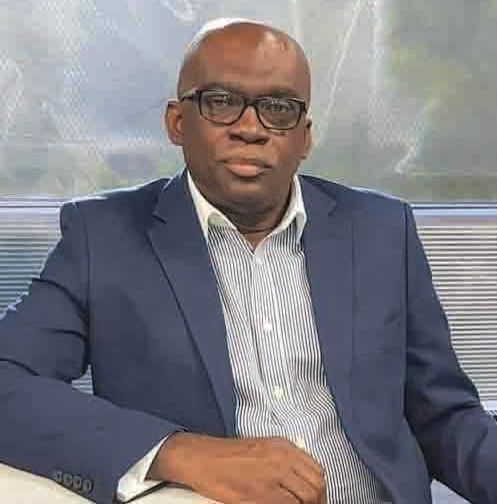
Demographic shifts and economic implications
The contrast between Europe’s ageing population and Africa’s burgeoning youth demographic is stark. Europe faces labour shortages and increased pension costs, impacting its economic stability and credit ratings. Conversely, Africa’s young population promises a dynamic workforce, offering significant economic potential but also posing challenges in terms of job creation and stability This demographic divergence necessitates a re-evaluation of the Africa-Europe partnership. The increasing interdependence between the continents is evident as they confront shared challenges, such as climate change, health security, migration, and technological innovation. McNair emphasises that cooperation is essential; Europe needs Africa’s youthful vigour and market potential, just as Africa benefits from Europe’s experience and capital.
The need for a paradigm shift
PUBLISHER’S NOTE
McNair critiques the outdated assumptions driving Europe’s approach to Africa. European leaders often view African nations through a paternalistic lens, framing them as underdeveloped and in need of European intervention. This perspective is embedded in terms like “developed” and “developing” countries, perpetuating a narrative of European superiority.
www.africabrie
Publisher
Jon Offei-Ansah
Editor
Desmond Davies
Contributing
Editors
Prof. Toyin Falola
Tikum Mbah Azonga
Prof. Ojo Emmanuel Ademola (Technology)
Valerie Msoka (Special Projects)
Contributors
Justice Lee Adoboe
Chief Chuks Iloegbunam
Joseph Kayira
Zachary Ochieng
Olu Ojewale
Oladipo Okubanjo
Corinne Soar
Kennedy Olilo
Gorata Chepete
Designer
Jon Offei-Ansah Publisher
Desmond Davies Editor
IShifting geopolitical dynamics
Simon Blemadzie
Country Representatives
To foster a more equitable partnership, McNair calls for a paradigm shift. He draws on Thomas Kuhn’s concept of scientific revolutions, suggesting that current norms must give way to new frameworks that recognise diverse development paths. Instead of a one-size-fits-all approach, cooperation should leverage the unique strengths and contexts of both continents, fostering mutual growth and development.
n 2018, six of the 10 fastest-growing economies in the world were in Africa, according to the World Bank, with Ghana leading the pack. With GDP growth for the continent projected to accelerate to four per cent in 2019 and 4.1 per cent in 2020, Africa’s economic growth story continues apace. Meanwhile, the World Bank’s 2019 Doing Business Index reveals that five of the 10 most-improved countries are in Africa, and one-third of all reforms recorded globally were in sub-Saharan Africa. What makes the story more impressive and heartening is that the growth – projected to be broad-based – is being achieved in a challenging global environment, bucking the trend.
Deputy Editor
Angela Cobbinah
South Africa
Edward Walter Byerley
The analysis highlights the geopolitical shifts influencing Africa-Europe relations. Populism, exemplified by Brexit and the rise of right-wing movements, alongside the growing influence of China, have reshaped the global landscape. African leaders, emboldened by their countries’ strategic importance, are increasingly asserting their role on the global stage. This shift is exemplified by calls for reforms in global economic governance and Africa’s successful campaign for a seat at the G20.
Stephen Williams Contributing Editor
Director, Special Projects
Michael Orji
Top Dog Media, 5 Ascot Knights
47 Grand National Boulevard Royal Ascot, Milnerton 7441, South Africa
Tel: +27 (0) 21 555 0096
Cell: +27 (0) 81 331 4887
In the Cover Story of this edition, Dr. Hippolyte Fofack, Chief Economist at the African Export-Import Bank (Afreximbank), analyses the factors underpinning this performance. Two factors, in my opinion, stand out in Dr. Hippolyte’s analysis: trade between Africa and China and the intra-African cross-border investment and infrastructure development.
Much has been said and written about China’s ever-deepening economic foray into Africa, especially by Western analysts and commentators who have been sounding alarm bells about re-colonisation of Africa, this time by the Chinese. But empirical evidence paints a different picture.
Justice Lee Adoboe Chuks Iloegbunam
Joseph Kayira
Zachary Ochieng
McNair notes that while the old order is clearly outdated, a new one has yet to fully emerge. This transitional period, or “interregnum,” requires policymakers to navigate uncharted waters, balancing domestic interests with the need for international cooperation on global challenges like climate change and pandemic preparedness.
Olu Ojewale
Oladipo Okubanjo Corinne Soar Contributors
Gloria Ansah Designer
Email: ed@topdog-media.net
Ghana
Nana Asiama Bekoe
Kingdom Concept Co.
Tel: +233 243 393 943 / +233 303 967 470 kingsconceptsltd@gmail.com
Despite the decelerating global growth environment, trade between Africa and China increased by 14.5 per cent in the first three quarters of 2018, surpassing the growth rate of world trade (11.6 per cent), reflecting the deepening economic dependency between the two major trading partners.
The Covid-19 pandemic and Russia’s invasion of Ukraine underscore the complexities of the Africa-Europe partnership. Europe’s initial vaccine hoarding and diversion of resources to Ukraine highlighted the risk of an inward-focused approach. Simultaneously, African nations seeking support from other global powers, such as Russia and China, demonstrate the need for a balanced and collaborative strategy.
Country Representatives
South Africa
Nigeria
Empirical evidence shows that China’s domestic investment has become highly linked with economic expansion in Africa. A one percentage point increase in China’s domestic investment growth is associated with an average of 0.6 percentage point increase in overall African exports. And, the expected economic development and trade impact of expanding Chinese investment on resource-rich African countries, especially oil-exporting countries, is even more important.
Despite these challenges, McNair identifies significant opportunities for mutual benefit. Both continents face the risks associated with large numbers of young people without job opportunities and climate-induced migration. By leveraging each other’s strengths, Africa and Europe can address these issues more effectively.
Edward Walter Byerley Top Dog Media, 5 Ascot Knights 47 Grand National Boulevard Royal Ascot, Milnerton 7441, South Africa
Nnenna Ogbu #4 Babatunde Oduse crescent
The resilience of African economies can also be attributed to growing intra-African cross-border investment and infrastructure development. A combination of the two factors is accelerating the process of structural transformation in a continent where industrial output and services account for a growing share of GDP. African corporations and industrialists which are expanding their industrial footprint across Africa and globally are leading the diversification from agriculture into higher value goods in manufacturing and service sectors. These industrial champions are carrying out transcontinental operations, with investment holdings around the globe, with a strong presence in Europe and Pacific Asia, together account for more than 75 per cent of their combined activities outside Africa.
Tel: +27 (0) 21 555 0096 Cell: +27 (0) 81 331 4887 Email: ed@topdog-media.net
Ghana
Isheri Olowora - Isheri Berger, Lagos Tel: +234 803 670 4879 getnnenna.ogbu@gmail.com
Achieving a successful partnership requires reframing the relationship and moving beyond traditional narratives. Europe’s role as a global trade power, provider of development aid, and political actor must evolve to address contemporary geopolitical challenges. This involves fostering networks of creativity, commerce, and problem-solving that transcend institutional boundaries.
Nana Asiama Bekoe
Kingdom Concept Co. Tel: +233 243 393 943 / +233 303 967 470 kingsconceptsltd@gmail.com
Nigeria
A new approach to the Africa-Europe partnership should focus on shared challenges, such as managing migration flows, addressing climate change, and investing in global public goods. By embracing mutual interests and values, both continents can navigate the current era of disruption and confusion, building a genuine partnership based on equality and cooperation.
A survey of 30 leading emerging African corporations with global footprints and combined revenue of more than $118 billion shows that they are active in several industries, including manufacturing (e.g., Dangote Industries), basic materials, telecommunications (e.g., Econet, Safaricom), finance (e.g., Ecobank) and oil and gas. In addition to mitigating risks highly correlated with African economies, these emerging African global corporations are accelerating the diversification of sources of growth and reducing the exposure of countries to adverse commodity terms of trade.
This makes me very bullish about Africa!
David McNair’s analysis illuminates the transformative potential of Africa’s youth demographic and the need for a paradigm shift in Africa-Europe relations. By recognising and leveraging their respective strengths, the two continents can forge a partnership that addresses shared challenges and maximises opportunities for mutual benefit. The future of this relationship hinges on a new narrative, one that fosters collaboration, innovation, and shared prosperity

Taiwo Adedoyin MV Noble, Press House, 3rd Floor 27 Acme Road, Ogba, Ikeja, Lagos Tel: +234 806 291 7100 taiadedoyin52@gmail.com
Kenya
Naima Farah Room 22, 2nd Floor West Wing Royal Square, Ngong Road, Nairobi Tel: +254 729 381 561 naimafarah_m@yahoo.com
Africa Briefing Ltd
2 Redruth Close, London N22 8RN United Kingdom Tel: +44 (0) 208 888 6693 publisher@africabriefing.org
Kenya Patrick Mwangi Aquarius Media Ltd, PO Box 10668-11000 Nairobi, Kenya
Tel: 0720 391 546/0773 35 41
Email: mwangi@aquariusmedia.co.ke
©Africa Briefing Ltd
2 Redruth Close, London N22 8RN
United Kingdom
Tel: +44 (0) 208 888 6693 publisher@africabriefing.org
Cover pic: Exio Cabreja/Flikr
6 07
It’s time to defuse the ticking time bomb
08
Finding an answer to irregular migration
Empowering Africa’s young technicians
Ojo Emmanuel Ademola discusses the transformative potential of technology education in Africa, and how investing in STEM and mentorship programmes can empower African youth and drive sustainable development
10
Aligning technology with Agenda 2063

Harnessing technical skills in line with the African Union’s plans for the continent can drive socio-economic development and innovation across Africa, writes Ojo Emmanuel Ademola
Europe needs Africa, and Africa needs Europe
In this insightful analysis by David McNair, discover why the future prosperity of both Europe and Africa hinges on mutual cooperation and strategic partnership. Learn how demographic shifts, economic opportunities, and shared challenges make their interdependence crucial
22
South African women call for ‘equitable governance’ after elections
AS South Africa reels from the outcome of the recent elections that saw the ANC having to share power for the first time in 30 years, women in the country have added their voices to the call to “reset and rejuvenate governance”. We publish their statement below
28
Will Nigerians mirror Kenyans?
The patterns of the chain of events that brought about the current situation in Kenya can be found in Nigeria, says Toyin Falola
32
A recent report by the World Travel and Tourism Council paints a promising future of Africa's tourism sector, projected to grow at 5.1 percent annually between 2023 and 2033, driven by key players like Madagascar, Libya, and Mauritius. Jon Offei-Ansah read the report 08
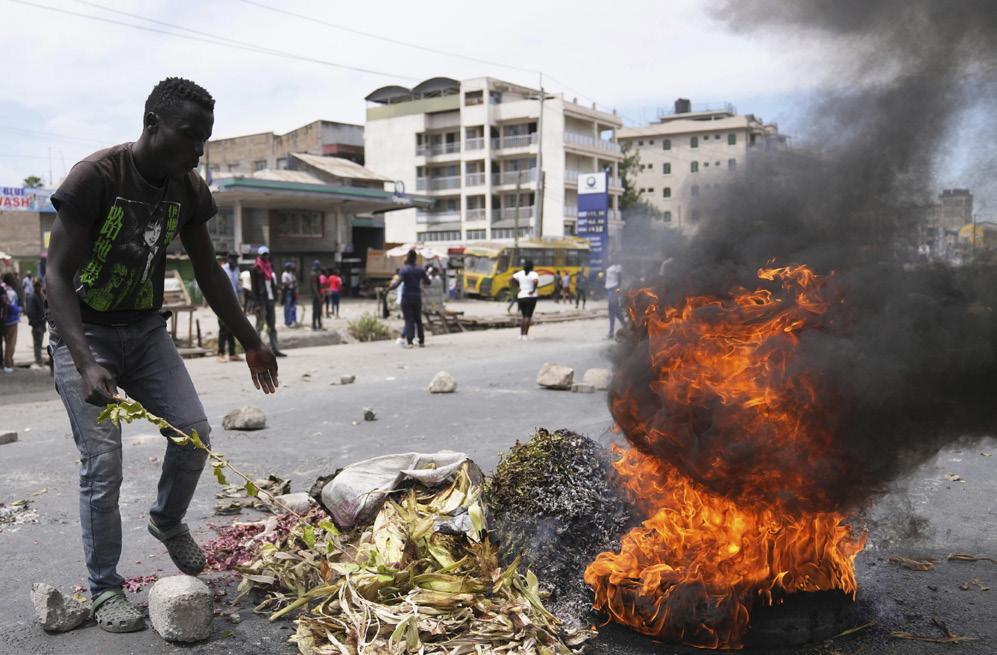
14 34
Africa’s tourism sector poised for significant growth by 2033
32
28

The art of living
speaks to the internationally acclaimed
who is still going strong at 90 with a new exhibition in London
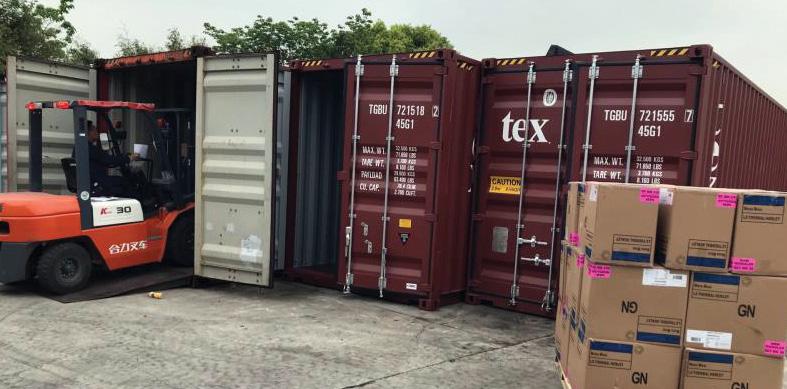
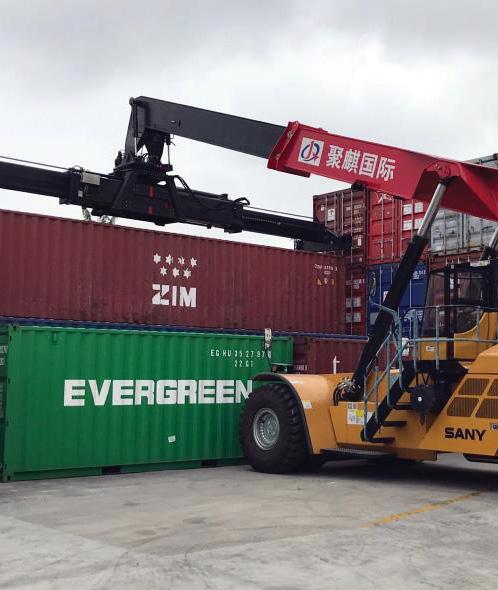
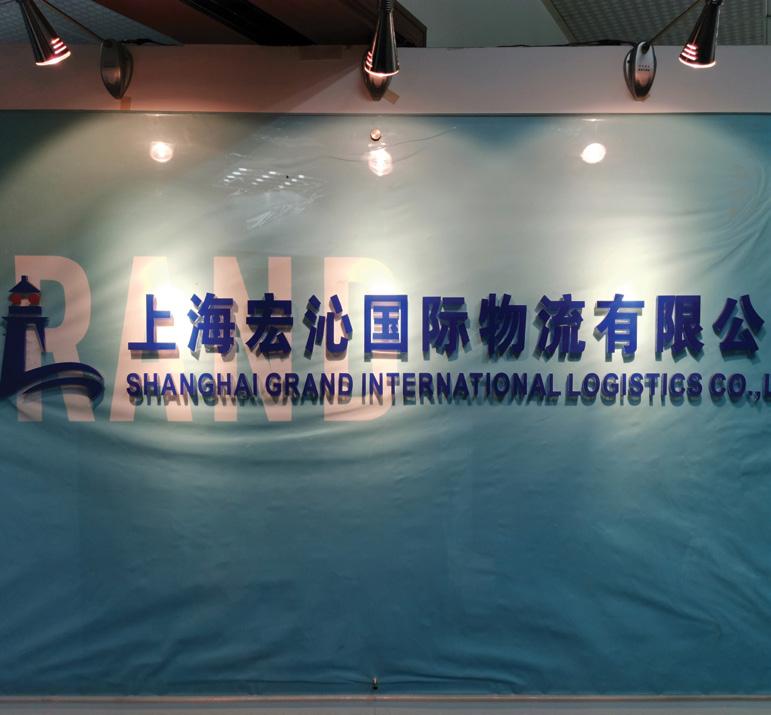
Established in 2002, Shanghai Grand International Co., Ltd. offers a variety of shipping and transportation options via air, sea and ground. Our company is based in Shanghai, China, with branches across the nation. Ranging from customs declaration, warehouse storage, containers and consolidated cargo shipping we have a large array of options to meet your needs.
In addition to being approved and designated by the Ministry of Transportation of China as a First Class cargo service provider, we have also established excellent business relations with major shipping companies including Maersk, CMA, ONE, SM line, and
C.E.O President.
Mr, Felix Ji
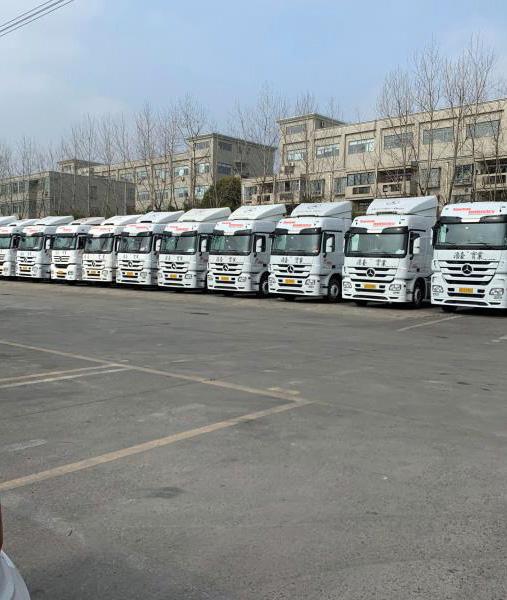
EMC over the past 15 years. In addition we have also built long term business relations with major airline cargo departments. In order to expand our global operation, we are looking for international partnerships to work together in this industry. Should you ever import any goods from Peoples Republic of China please ask your exporter and shipper to contact us. We will provide our best service to you.
Room 814, 578 Tian Bao Lu, Shanghai, Peoples Republic of China
E-Mail: felix@grand-log.net phone: 86-13501786280
WILLIAM Ruto thought that it would be easy after young Kenyans solidly backed him in the presidential election of 2022 that saw him take over the leadership of the country after serving as deputy president for nine years. As things have turned out, he was sorely mistaken.
The same young people that he took for granted are now up in arms against his government. They have not taken kindly to plans to apply more financial squeeze on an already economically straitened group of Kenyans who see their leaders regularly flaunting wealth that many of them cannot honestly justify.
The riots that followed – leading to a number of deaths – have shaken the core of Ruto’s administration. Heads have rolled in an apparent knee-jerk response to the unsettling state of affairs in the country. Ruto has sacked his entire Cabinet, save for the deputy president and foreign minister.
But the anger in Kenya is far from over. The tension will hang over the country for as long as the government fails to create the environment for the millions of jobs needed to make life a lot better for young Kenyans.
Sadly, the eruptions in Kenya could easily engulf other African countries where leaders are equally culpable of treating their young citizens with disdain. Indeed, they have never been convinced by their political leaders who say things that they do not really mean.
Now young Africans are no longer ready to listen to the empty promises, and are ready to take action. The politicians have failed to transform the substantial youth population on the continent into a solid asset in the development of Africa. Instead, they have had to eke out a living while those in authority live a comfortable life – acting as masters, rather than servants, of the people.
The arrogance of African leaders is pushing young people to react in the manner that we have seen in Kenya. A few years ago, young Nigerians also flexed their muscles against their government; as was the recent case in Senegal before
the 43-year-old Bassirou Diomaye Faye became president in April this year.
What is sorely needed now, from the perspective of ordinary Africans, is for their leaders to build trust and keep to their words, rather than change tack once they are in power.
The African Union must not turn a blind eye to the struggles of young Africans. It has to intervene in a more robust way instead of just mouthing platitudes.
It is the same AU that has set 2063 as the deadline for “transforming Africa into the global powerhouse of the future”. Its Agenda 2063 envisages an Africa that, among other things, will provide “people centred development, gender equality and youth empowerment”.
How can this be achieved when those who are supposed to be in charge of Africa’s destiny in under 40 years’ time are not being prepared now for the task ahead? After all, most of the political leaders in Africa today will not be around to see whether or not Agenda 2063 is achieved.
It is going to be a tough battle for the continent because young people have been taken for granted for far too long. They now want to have a say in decision-making that will foster trust.
loath to communicating with their citizens because when issues are obfuscated, those in power get away with socio-economic mismanagement. For government press officers in Africa who regularly try to shield their political masters from public scrutiny through the media, they should know that providing evidence in policymaking, while using regular public communication to do so, is crucial to building trust.
In all this, there is a need to entrench good governance and the rule of law that can generally lead to the reduction of tensions in Africa. Once these are in place, regular elections that cannot be rigged can make a difference.
Young Africans were until recently disinterested in politics because of its machinations which can wear them down. Things are changing now because they know that they can make a difference, as we saw when they got Ruto to power two years ago, and are now making life difficult for him.
The political elite in Africa needs to stop acting in a high-handed manner when it comes to dealing with youth unemployment and inequality in society. Everyone has a stake in ensuring that good governance and the rule of law work on the continent.
Africans are agents of change; using the streets to make their point ‘ ’
African governments should better engage citizens in this area and actively communicate the evidence behind their decisions, while combating misinformation and disinformation.
Alas, governments on the continent are
Young Africans are agents of change, and are now using the streets to make their point. The time bomb is ticking and if it is not defused soon, the explosion will be catastrophic for a continent that greatly needs peace and security as it moves to 2063. AB
WITH the Labour Party now in power in the UK after 14 years in opposition, new Prime Minister Sir Kier Starmer is busy overturning policies by the Conservative government that lost an unprecedented 251 seats. One of the sticking points under Tory rule was the thorny issue of illegal immigration.
In a desperate move to counter this, the Conservative government entered into a controversial £400 million deal with Rwanda in 2022 for the country to take in migrants for their asylum claims to be “processed”. The plan called for “anyone entering the UK illegally” after January 1, 2022 to be sent to Rwanda, where they would apply for asylum.
But from the outset, there was a legal tug of war between the British government and asylum bodies in the courts. By the time the Conservatives were thrown out of power by a disenchanted British electorate, the plan was going nowhere even though the government had forked out £270 million to the Rwandan government.
illegal immigration that is only benefiting unscrupulous people traffickers. The Conservative government was exasperated by the apparent lukewarm attitude of French officials to the people smugglers operating from French beaches.
Many saw it as French bloodymindedness over the UK leaving the European Union. Once Brexit took effect, the UK lost out under the EU’s Asylum Procedures Directive which sets out a common procedure for granting and withdrawing international protection.
Nevertheless, the French do not have any reason to turn a blind eye to the activities of people smugglers. However, even if some of those trafficked are genuine refugees they cannot pick and choose where they will seek asylum.
The Refugee Convention of 1951 states that the right to flee one’s country does not necessarily mean that refugees have the right to choose their country of asylum. Hence the concept of the first safe country of asylum.
Bayern Munich’s Alphonso Davies was born in a refugee camp
’
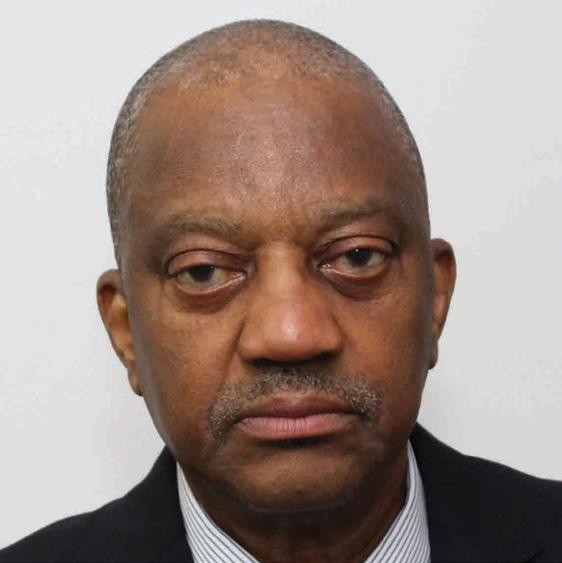
This scenario is a far cry from the refugee camps that I have visited in Ethiopia, Djibouti, Somalia, Liberia and Ghana over the years. There, one saw people who were traumatised and trying to cope with the uncertainties of their future.
Despite this, there are many refugees from such camps in Africa who have made good as a result of orderly refugee resettlement programmes. Take the Buduburam camp, which was established in 1990 about 20 miles from Accra, for Liberians fleeing the civil war in their country.
When I visited it many times during an assignment in Ghana in 2005, I was always amazed to see how the refugees were dealing with the harsh reality of life. One thing that attracted my attention was the crowd clustered around the noticeboard outside the camp’s community centre.
They were looking to see whether they had been granted asylum by the US, Canada or Australia. What these three countries did was to send their consular staff from their diplomatic missions in Accra to interview the refugees and decide which ones qualified for asylum.
Now Starmer has said he is “not prepared to continue with gimmicks” as he announced that the multimillion-pound scheme will be killed off. The Rwandan government, in response, said that was fine because it was a British government initiative, and Kigali would keep the £270 million already disbursed by the Conservatives.
The whole system of asylum and migration has become a political hot potato around the world. The problem is the blurring of the lines between asylum seekers and illegal migration, which has lumped those genuinely seeking protection with the illegals.
Every government has a right to halt
So, it does not make sense for asylum seekers to enter and pass through several safe countries in Europe to make their way to the UK on perilous journeys across the English Channel. This is because the people smugglers have sold their clients a different story.
It is clearly a money-making racket that sees the people smugglers earning millions of dollars, given that they charge up to $30,000 to take people across to the UK. In most countries from where the illegal migrants come from this is a princely sum.
Those asylum seekers that are taken in by the British coastguard appear well heeled. They are attired in designer jeans and trainers with expensive looking watches on their wrist.
That is how the current Bayern Munich and Canada left back, Alphonso Davies, made it to North America with his parents in 2005. He was born in Buduburam in 2000, and I might have seen him running around kicking a football when I visited. Look at how well he has done for himself as a result of an orderly refugee settlement programme. He is now a Goodwill Ambassador for the UN Refugee Agency.
Of course, there are countless numbers of unsung heroes who have also benefited from such a programme. And they have also been assets to their countries of asylum.
It is clear that safe and legal routes to claim asylum are the answer to the activities of the odious people traffickers as governments try to dismantle the illegal business that is costing lives unnecessarily. AB
Ojo Emmanuel Ademola discusses the transformative potential of technology education in Africa, and how investing in STEM and mentorship programmes can empower African youth and drive sustainable development
AS Africa stands on the brink of a new era of transformation and progress, aligning projective outcomes with the African Union Agenda 2063 promises sustainable development and socio-economic advancement across the continent. With a commitment to five years of uninterrupted implementation starting in 2025, this strategic collaboration aims to harness the power of innovation, technology, and education to empower African youth and propel the continent towards a brighter future. By integrating key initiatives that align with the goals of the AU Agenda 2063, this endeavour seeks to address Africa's pressing challenges and unlock its incredible potential.
Investing in technology education, training, and mentorship programmes is crucial for harnessing Africa's potential and driving sustainable development. The youth of Africa are the future leaders and innovators, and by equipping them with the necessary skills and support, we can ensure they are well-prepared to drive progress and shape the future.
STEM (Science, Technology, Engineering, and Mathematics) education is essential for building a strong foundation for African youth to excel in the tech sector. Providing specialized training in emerging technologies such as artificial intelligence (AI) can ensure that young Africans have the knowledge and expertise to lead innovation and drive growth in key industries. Additionally, mentorship programmes from experienced professionals can play a vital role in guiding and supporting these young tech enthusiasts as they navigate their career paths.
By investing in the development and empowerment of African youth in technology, we can unlock a wealth of
opportunities and drive sustainable growth across the continent. Collaboration, dedication, and strategic investment in the next generation of African innovators will lay the groundwork for a vibrant tech ecosystem that fosters creativity, drives innovation, and propels Africa towards a brighter future.
The advancement and empowerment of African youth in technology are paramount to unlocking the vast potential of the continent and driving its progress into the future. Investment in technology education, training, and mentorship programmes serves as the cornerstone for developing a generation of skilled and innovative
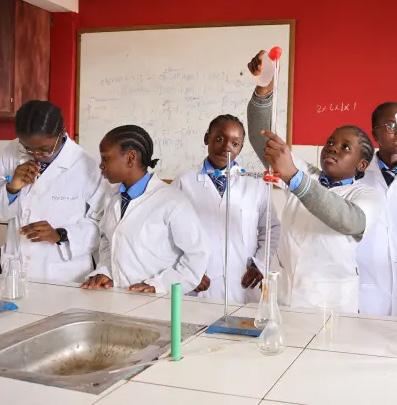
technologists who will lead Africa into the digital age.
With proper education and training in technology, young Africans can acquire the skills needed to excel in the rapidly evolving tech sector. By equipping them with the knowledge of cutting-edge technologies and tools, we can empower them to contribute to economic growth, innovation, and job creation across various industries. The support provided through mentorship programs from seasoned professionals will offer guidance, encouragement, and real-world insights to help navigate the complexities of the tech landscape.
Fostering a culture of entrepreneurship and creativity among African youth in technology will encourage them to think outside the box, take risks, and pursue their entrepreneurial aspirations. By instilling a spirit of innovation and problem-solving in the youth, we can cultivate a dynamic ecosystem that will drive technological

advancements and address pressing challenges facing the continent.
Ultimately, investing in the development of African youth in technology is an investment in Africa’s future prosperity and competitiveness on the global stage. By empowering the next generation of tech leaders and innovators, we can ensure that Africa leverages the power of technology to drive sustainable development, create opportunities for all, and shape a prosperous future for generations to come.
Nurturing a generation of skilled and empowered technologists in Africa is not just about creating individual success stories but about building a collective foundation for driving innovation, prosperity, and progress across the continent. By providing young Africans with a solid foundation in STEM education, specialised training in emerging technologies such as AI, and mentorship from experienced professionals, we can pave the way for them to make significant contributions to the tech sector.
By equipping young Africans with the necessary skills and knowledge to excel in the tech sector, we empower them to unlock their full potential, pursue their passions, and create a positive impact on their communities and the world at large. Through mentorship and guidance from experienced professionals, these aspiring technologists can gain valuable insights, network connections, and real-world experiences that will accelerate their growth and success in the industry.
Government, private sector, educational institutions, and non-profit organisations all play crucial roles in fostering the growth and success of the next generation of African innovators. By pooling together expertise, resources, and networks, a vibrant tech ecosystem can be created that nurtures creativity, fosters innovation, and propels Africa forward towards a brighter tomorrow.
Government policies should focus on providing infrastructure, funding, and regulatory support to enable the growth of tech education and entrepreneurship. The private sector can contribute by offering internships, sponsorships, and partnerships that provide practical experience and exposure to real-world challenges. Educational institutions need to update curricula to include the latest
technological advancements and provide hands-on learning opportunities. Nonprofit organisations can bridge gaps by offering specialised training programs and mentorship opportunities to underserved communities.
Focusing on inclusivity and diversity within the tech industry is essential to tapping into the diverse talents and perspectives of African youth. Empowering marginalised communities, women, and young people from underserved regions will not only create a more equitable tech sector but also unlock untapped potential and ideas that can drive meaningful change.
Programmes aimed at increasing the participation of women and underrepresented groups in tech should be prioritised. This includes providing scholarships, creating safe and supportive learning environments, and promoting role models and mentors who can inspire the next generation. By fostering an inclusive culture, the tech industry can benefit from a wider range of ideas and solutions that reflect the needs and aspirations of the entire population.
Investing in the development and empowerment of African youth in technology is the key to unlocking a brighter future for the continent. By providing the necessary support, resources, and opportunities for young technologists to succeed, we can create a more prosperous, inclusive, and digitally advanced Africa. Through collaboration between government, the private sector, educational institutions, and non-profit organisations, we can collectively contribute to the growth and success of the next generation of African innovators. By pooling together our expertise, resources, and networks, we can create a vibrant tech ecosystem that nurtures creativity, fosters innovation, and propels Africa forward towards a brighter tomorrow.
By embracing a holistic and inclusive approach, we can leverage technology to create a world where no one is left behind, turning humorous aspirations into tangible realities. The true measure of technological progress will not merely be in the sophistication of our gadgets but in our ability to make those advancements work for the betterment of all. Together, we can shape a future where Africa stands at the forefront of innovation, creativity, and prosperity.
Harnessing technical skills in line with the African Union’s plans for the continent can drive socio-economic development and innovation across Africa, writes Ojo Emmanuel
AS Africa embarks on a transformative journey towards sustainable development and socio-economic advancement, aligning projective outcomes with the African Union Agenda 2063 promises a bold vision for the continent's future. With an envisioned commencement in 2025 and a commitment to five years of uninterrupted implementation, this strategic collaboration aims to harness the power of innovation, technology, and education to empower African youth and propel the continent towards a brighter future. By integrating key initiatives that align with the goals of the AU Agenda 2063, this endeavour seeks
to address Africa's pressing challenges and unlock its incredible potential.
Harnessing the power of analytics to drive impactful change, our approach to measuring the success of investing in technology education and the empowerment of African youth is centred on key metrics and strategies. By analysing the impact, skills development, mentorship effectiveness, industry partnerships, innovation outcomes, inclusivity, and long-term impact of these programmes, we aim to quantify the value created, track progress towards desired outcomes, and inform strategic decision-making for a more prosperous and inclusive tech
ecosystem in Africa. Through a data-driven approach, we seek to empower the next generation of African technologists and innovators, unlocking their full potential and driving sustainable development across the continent.
To develop an analytics approach on investing in technology education and the empowerment of African youth, we should consider several key metrics and strategies.
Analysing the impact of technology education and empowerment programmes on the youth in Africa involves tracking metrics such as the number of participants in training programmes, graduation rates, employment rates post-graduation, and the

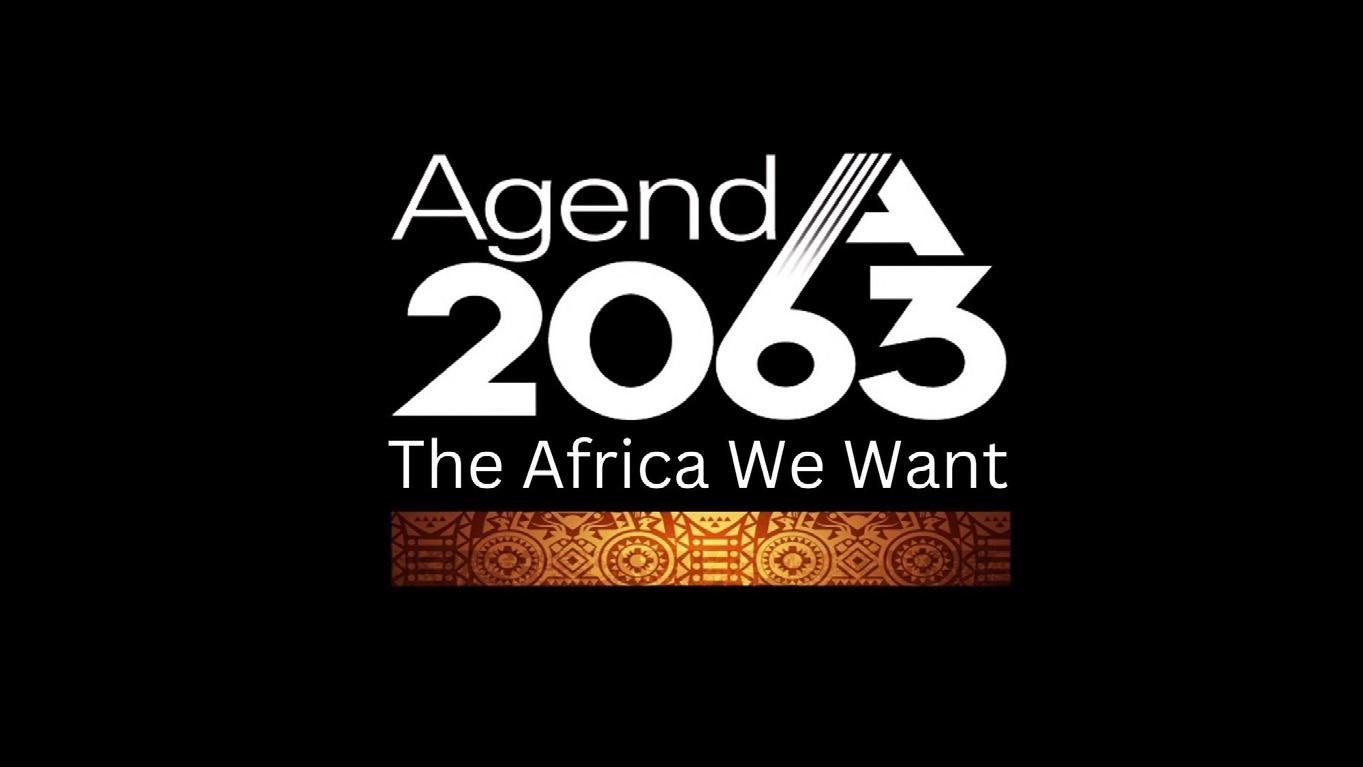
number of successful tech startups launched by programme alumni. This comprehensive analysis helps in understanding the effectiveness of the programmes and identifying areas for improvement.
Using analytics to assess the effectiveness of skills development initiatives involves tracking the acquisition and application of technical skills among program participants. Evaluating competencies gained in areas such as coding, data science, web development, and project management provides insights into the readiness of the participants for the tech industry and their ability to contribute meaningfully to various sectors.
Evaluating the impact of mentorship programmes requires tracking engagement levels between mentors and mentees, measuring knowledge transfer, and assessing the career growth and advancement of mentees over time. This evaluation helps in understanding the value of mentorship in shaping the careers of young technologists and providing them with the guidance needed to navigate the complexities of the tech landscape.
Measuring the success of partnerships with industry stakeholders involves tracking the number of collaborations, joint projects, and internships facilitated through these partnerships. Assessing the contribution of industry partners in providing real-world insights, resources, and opportunities for programme participants helps in strengthening the link between education and industry needs.
Using analytics to track the innovation and entrepreneurship outcomes of programme participants involves measuring the number of startups founded, patents
filed, and innovative solutions developed by youth in the tech sector. Analysing the business growth, revenue generation, and social impact of these ventures provides insights into the entrepreneurial spirit and innovation potential of the participants.
Assessing the inclusivity and diversity within the tech sector involves tracking the representation of women, minority groups, and individuals from underserved communities in technology education and empowerment programmes. Measuring the progress towards creating a more diverse and inclusive tech ecosystem ensures that the benefits of technological advancements reach all segments of society.
Evaluating the long-term impact of investing in technology education and the empowerment of African youth involves tracking the success stories, career trajectories, and achievements of programme alumni. Measuring the broader socio-economic impact, technological advancements, and contributions to industry growth driven by empowered youth provides a holistic view of the programme's effectiveness.
By equipping African youth with essential tech skills and fostering a culture of innovation, the initiative will contribute to the AU Agenda 2063’s priority of investing in human capital development and unlocking the potential of Africa’s youthful population. This focus ensures that the continent's demographic dividend is harnessed to drive economic growth and development.
The sustained investment in technology education and empowerment programmes will align with the AU’s vision of leveraging digital technologies to drive
economic growth, enhance competitiveness, and promote inclusive development across the continent. This alignment ensures that Africa remains at the forefront of global technological innovation.
Through partnerships with regional stakeholders and the exchange of best practices in technology education, the initiative will support the AU’s objective of fostering regional integration and collaboration to realise Africa’s full potential in the digital era. This collaboration promotes knowledge sharing and capacity building across the continent.
By prioritising the inclusion of marginalised communities and promoting gender diversity in the tech sector, the initiative will contribute to achieving the AU Agenda 2063’s goal of advancing gender equality and women empowerment in all spheres of life. This emphasis ensures that technological advancements benefit all segments of society.
Through the development of a skilled tech workforce, nurturing innovation ecosystems, and fostering industry partnerships, the initiative will align with the AU’s aspirations for a prosperous, peaceful, and integrated Africa, driven by sustainable economic growth and technological advancement. By integrating the projective outcomes of technology education and empowerment programmes for African youth with the African Union Agenda 2063, a strategic roadmap emerges for harnessing the continent’s demographic dividend, fostering innovation-led growth, and ultimately realising a future where Africa stands at the forefront of global technological innovation and socioeconomic development by the year 2063.
The integration of projective outcomes with the African Union Agenda 2063 represents a crucial step towards realising a more prosperous, inclusive, and sustainable future for Africa. Through strategic alignment, commitment to implementation, and a focus on empowerment and innovation, this collaborative effort has the potential to drive significant progress and positive change across the continent. By leveraging the opportunities presented by technology, education, and youth empowerment, Africa can overcome its challenges and build a brighter tomorrow for generations to come. As we look towards the horizon of 2063 and beyond, let us continue to work together towards a shared vision of unity, progress, and prosperity for the African continent.
As Africa prepares to leverage the digital economy for sustainable development, economic growth and social inclusion, Ojo Emmanuel Ademola explores 10 unique opportunities and strategic approaches to transform the continent
AFRICA is at a critical juncture, poised to harness the power of the digital economy to drive sustainable development, economic growth, and social inclusion. With rapid advancements in technology and increasing connectivity across the continent, African countries and their citizens have numerous opportunities to leverage digital innovation and transform their economies. It is essential to explore these opportunities and consider the best approaches to effectively deploy them within the continent.
The digital economy offers a transformative potential for Africa, allowing the continent to leapfrog traditional barriers and unlock new pathways to progress and prosperity for all its citizens. This comprehensive guide delves into ten unique opportunities for Africa in the digital economy, along with strategies to maximise their impact.
Africa has witnessed tremendous success in mobile money services like M-Pesa, which has revolutionised financial inclusion by providing banking services to the previously unbanked. As mobile connectivity continues to expand, there is a significant opportunity to develop innovative digital payment solutions, enhance digital literacy, and promote economic empowerment through mobile banking and other fintech services. These advancements can bridge financial gaps and foster inclusive growth across the continent.
Agriculture remains a key sector in many African economies. Leveraging digital technology can transform the agricultural landscape by providing small-scale farmers with access to tools like weather forecasting applications, soil sensors, and market information platforms. These technologies enable farmers to make informed decisions, increase productivity, reduce risks, and access markets more efficiently. Digital platforms connecting farmers with buyers can streamline supply chains and ensure fair prices for produce,
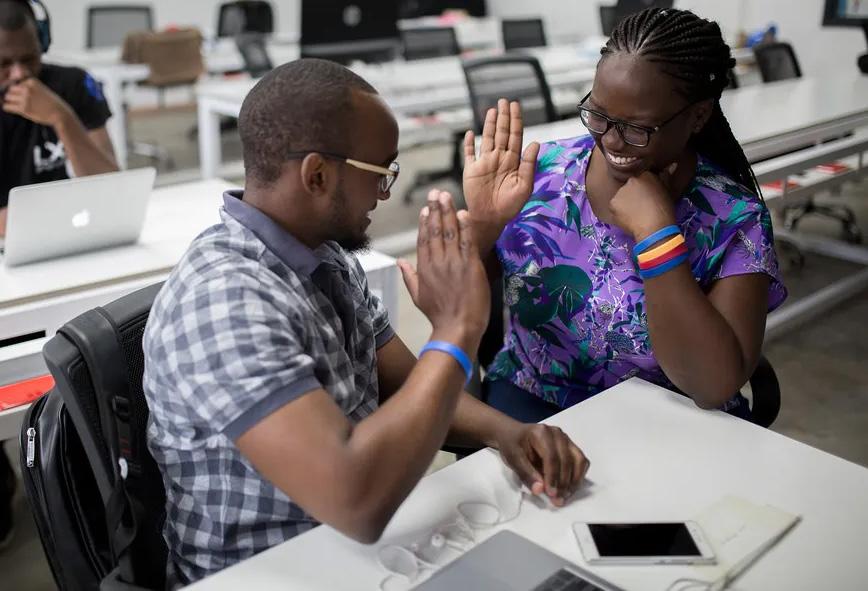
ultimately enhancing food security and rural livelihoods.
The traditional education system in Africa faces numerous challenges, including limited resources, infrastructure, and access to quality teachers. Embracing e-learning platforms and digital educational resources can democratise access to high-quality education, regardless of location. This approach can bridge the education gap, improve literacy rates, and provide career opportunities for the youth, particularly in regions where traditional educational institutions are lacking.
Digital connectivity has enabled remote work and entrepreneurship opportunities across various industries. In Africa, where mobility and access to job opportunities can be limited, digital platforms and online marketplaces offer a way for individuals to showcase their skills, collaborate on projects, and access a global job market. This potential can reduce unemployment rates, spur economic
growth, and foster a culture of innovation and entrepreneurship on the continent.
Access to quality healthcare is a significant challenge in many parts of Africa, especially in remote areas with limited infrastructure and healthcare professionals. Embracing telemedicine and telehealth solutions can provide medical consultations, diagnoses, and treatment remotely through digital platforms. These solutions improve healthcare access, reduce costs, save time, and enable early intervention for medical conditions, ultimately enhancing health outcomes for the population.
Data is a valuable resource that can drive informed decision-making in various sectors such as agriculture, healthcare, and urban planning. By harnessing data analytics tools and technologies, African countries can gather, analyse, and interpret data to identify trends, patterns, and opportunities for improvement. This approach can lead to more effective
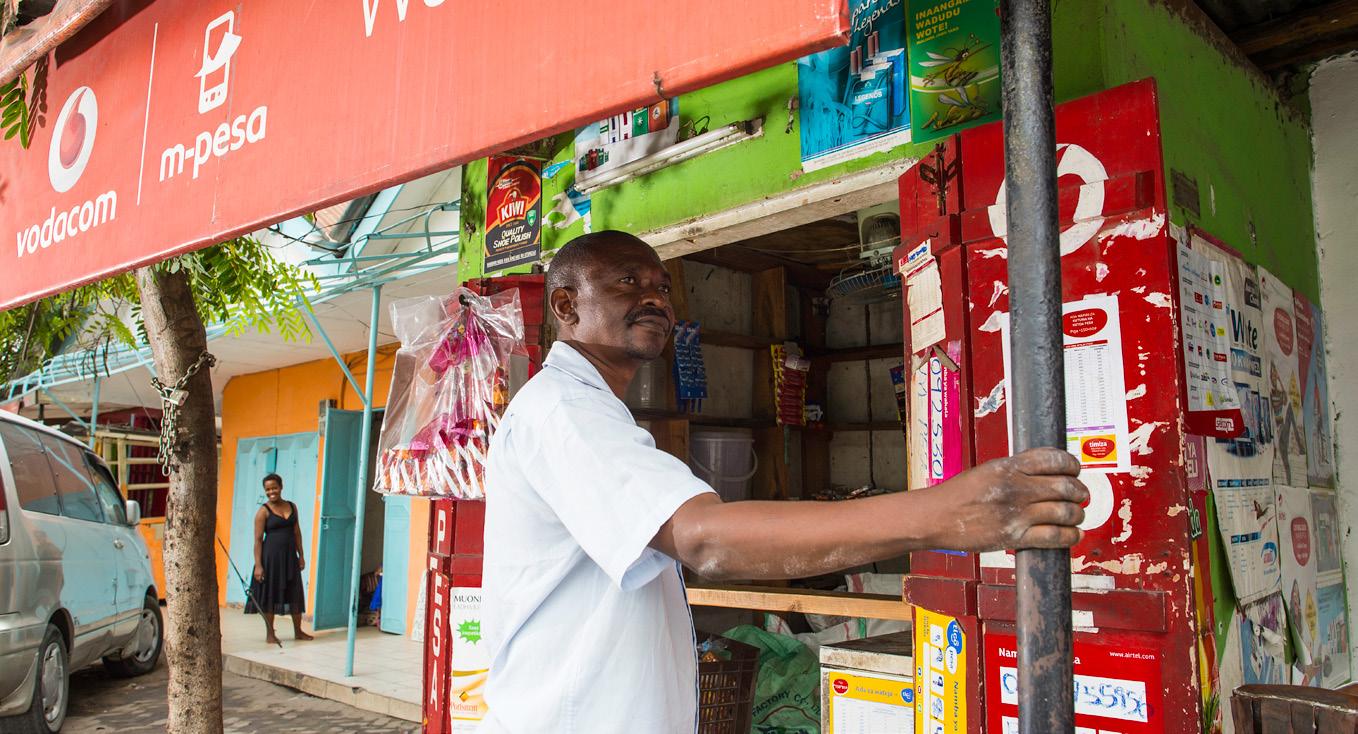
policies, improved service delivery, and enhanced productivity in key sectors of the economy.
Blockchain technology offers a secure, transparent, and decentralised way to record transactions and exchange assets. In Africa, where issues like land disputes and supply chain inefficiencies are common, implementing blockchain solutions can provide secure land registration systems, transparent supply chains, and efficient cross-border transactions. Leveraging blockchain technology can reduce corruption, increase trust in transactions, and enable more efficient trade and economic growth.
E-commerce has the potential to expand market reach, enable crossborder trade, and boost economic growth in Africa. Developing e-commerce platforms tailored to local needs allows businesses to reach a wider customer base, reduce barriers to entry, and increase revenue streams. This not only benefits businesses but also creates opportunities for job creation, skills development, and entrepreneurship in the digital economy.
With rapid urbanisation across Africa, there is a growing need for smart city initiatives that leverage digital technologies to improve urban efficiency, sustainability, and quality of life. Integrating IoT devices, data analytics, and smart infrastructure solutions can optimise resource management, reduce carbon emissions, enhance public services, and create more inclusive urban environments. Smart city initiatives can address challenges like traffic congestion, waste management, and energy consumption while promoting economic growth and environmental sustainability.
As digital technologies continue to evolve and shape the future of work, there is a critical need for upskilling and reskilling the workforce in Africa. Investing in digital skills development
programs, vocational training, and partnerships with tech companies can equip individuals with the necessary skills to thrive in the digital economy. This approach enhances employability, fosters a culture of innovation, entrepreneurship, and lifelong learning, and positions Africa as a leading hub for digital talent and technological advancement in the global market.
To maximise the potential of these digital opportunities, Africa needs to adopt strategic approaches that foster collaboration, capacity building, policy development, infrastructure investment, and community engagement.
Public-private partnerships:
Collaboration between the public sector, private sector, and civil society organisations is key to deploying digital solutions effectively. By working together, stakeholders can combine resources, share expertise, and leverage each other's strengths to ensure the successful implementation of digital initiatives.
Capacity building and training:
Investing in capacity building programs and training initiatives is essential to equip individuals with the skills needed to leverage digital technologies effectively. Providing hands-on training, workshops, and mentorship opportunities can empower citizens to thrive in the digital economy and drive innovation in key sectors.
Policy and regulatory frameworks: Establishing clear and supportive policy and regulatory frameworks is crucial to creating an enabling environment for digital innovation. Governments should implement policies that promote digital connectivity, protect data privacy, and foster a competitive marketplace for digital services. A conducive regulatory environment can attract investment, spur
innovation, and ensure sustainable growth in the digital economy.
Infrastructure development:
Access to reliable and affordable digital infrastructure is a prerequisite for deploying digital solutions across Africa. Governments should prioritise investments in building and expanding broadband networks, improving connectivity in rural areas, and enhancing cybersecurity measures to create a robust digital ecosystem that supports widespread adoption of digital technologies.
Local content and innovation:
Encouraging the development of locally relevant content and homegrown innovations ensures the long-term sustainability and relevance of digital initiatives. Supporting local entrepreneurs, startups, and content creators can promote cultural diversity, drive economic growth, and address the unique challenges and opportunities in the African market.
Community engagement and inclusivity: Engaging with local communities, stakeholders, and marginalised populations is key to ensuring that digital solutions are inclusive, accessible, and address the needs of all Africans. Incorporating feedback and involving people in the design and implementation of digital projects can foster social equity, bridge the digital divide, and create shared prosperity.
Monitoring and evaluation:
Establishing robust monitoring and evaluation mechanisms is essential to track the impact, effectiveness, and sustainability of digital initiatives. By collecting and analysing data on key performance indicators and outcomes, policymakers can make informed decisions, adapt strategies, and scale up successful projects to maximise their benefits.
As Africa embarks on its digital transformation journey, it is crucial to seize the numerous opportunities presented by the digital economy and leverage them to drive inclusive growth, foster innovation, and empower its people. By embracing public-private partnerships, investing in capacity building, establishing supportive policy frameworks, and prioritising infrastructure development, African countries can create a conducive environment for digital innovation to thrive. Engaging with local communities, promoting local content and innovation, and ensuring inclusivity and equity in digital initiatives can harness the transformative power of technology to unlock the continent's full potential. Through strategic deployment and targeted investments, Africa can overcome challenges and create a prosperous and sustainable future for all its citizens.
In this insightful analysis by David McNair, discover why the future prosperity of both Europe and Africa hinges on mutual cooperation and strategic partnership. Learn how demographic shifts, economic opportunities, and shared challenges make their interdependence crucial
IN 2017, Africa's population under 25 years old surpassed the total population of Europe. By 2050, Africa will have added 796 million people to the workforce, while Europe’s workingage population (aged between 16 to 64) will decline by 156 million. This demographic transformation is perhaps the defining shift that could recast the fortunes of the two continents, which are separated, at the closest point between Morocco and Spain, by just 14 kilometres.
Labour shortages and pension costs are already impacting the credit ratings of European countries, while the massive demand for employment in the African continent will have significant implications—positive and negative—in terms of migration, stability, future market potential, and economic dynamism.
Europe is aging while Africa’s youth population booms. This demographic shift is not the only long-term trend that could shape the Africa-Europe partnership. Managing climate change, biodiversity, health security and pandemic preparedness, migration, and the rapid pace of technological innovation requires cooperation across borders. In truth, almost all of the major threats and opportunities that Europe could face in the next century will require cooperation with Africa, either to limit harm or maximise opportunities. Europe needs Africa, at least as much as Africa needs Europe.
Yet, the unspoken assumption underpinning Africa-related decisions of Europe’s leaders—both inside and outside of the European Union (EU)—is that Europe is supposedly more advanced and that African countries are laggards. They are beset with problems and need to be more like European countries to converge with a better way of living and managing their societies. This is borne out in the lexicon of “developed” and “developing” countries, in the indices regularly published by international institutions and think tanks, and in the objectives and goals of Europe’s
development cooperation with Africa.
The premise of this discussion is that the European policymaking community needs to flip this narrative and recognise that there are different development paths informed by context-specific factors, as well as common challenges that different countries and regions need to grapple with together. From that perspective, cooperation between Africa and Europe should build on both continents’ strengths to identify converging interests, compatible visions,
and potential synergies.
Thomas Kuhn, in his seminal book The Structure of Scientific Revolutions, introduced the concept of a paradigm shift. Kuhn showed that “normal science”— periods of steady incremental progress in which researchers worked largely to validate their current paradigm—were punctuated by periods of disruption in which the old paradigm failed, and a new one emerged. The principle can be applied to policymaking and politics. Ideas harden
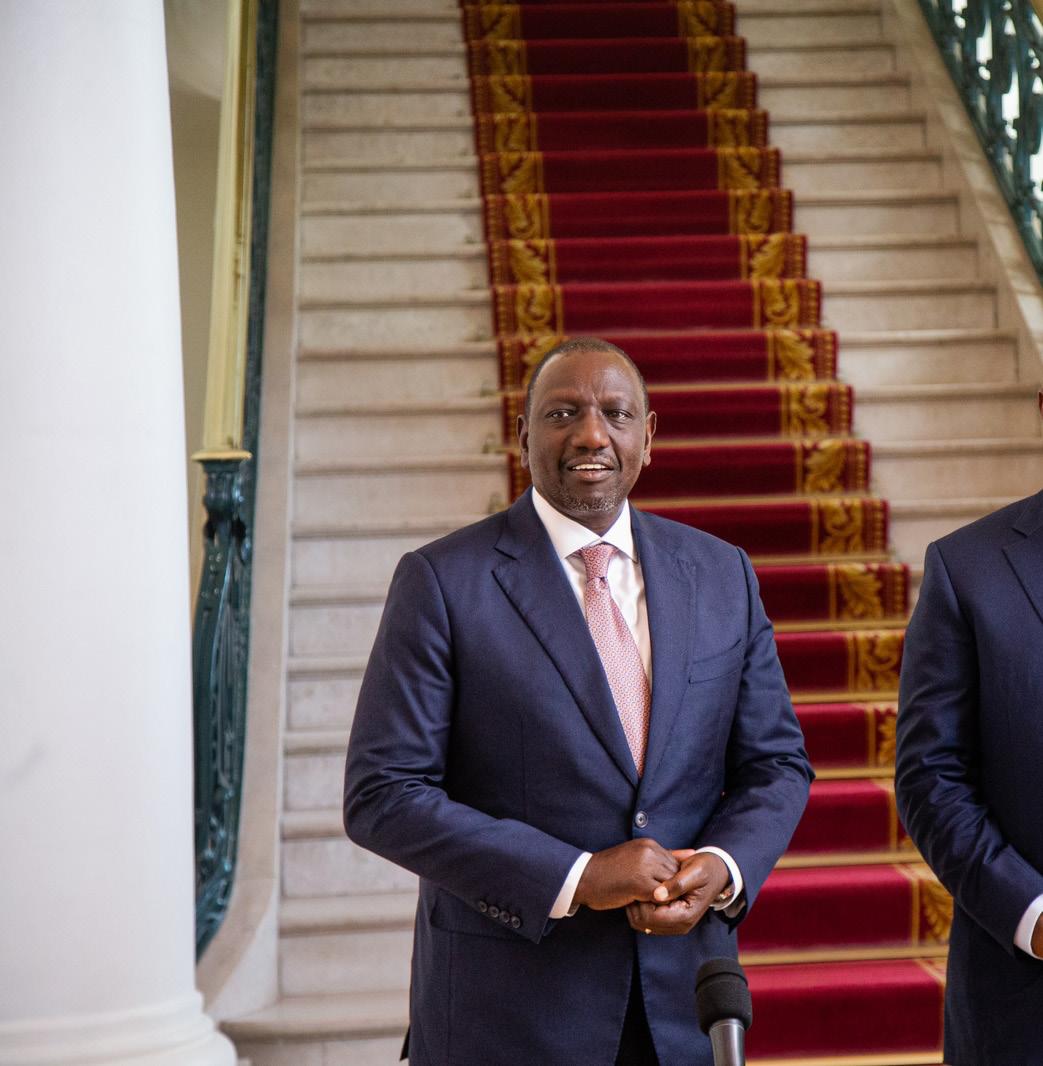
into norms around which politicians and policymakers build careers, institutions build treaties, and media outlets build narratives. This is the status quo until these norms become obsolete, and a new one emerges.
One can argue that the norms which have shaped the careers of many current policymakers are now out of date. In April 2023, US National Security Adviser Jake Sullivan outlined a “new Washington consensus,” implying that the old one, which had shaped a generation of economic and foreign policy making, had passed.
A wave of populism led to the UK’s Brexit referendum, the election of former US president Donald Trump, and the emergence of right-wing political movements across Europe, a trend borne out in the 2024 European Parliament elections. The same wave has been accompanied by the growing influence of China, increasing geopolitical competition between the United States and China, and
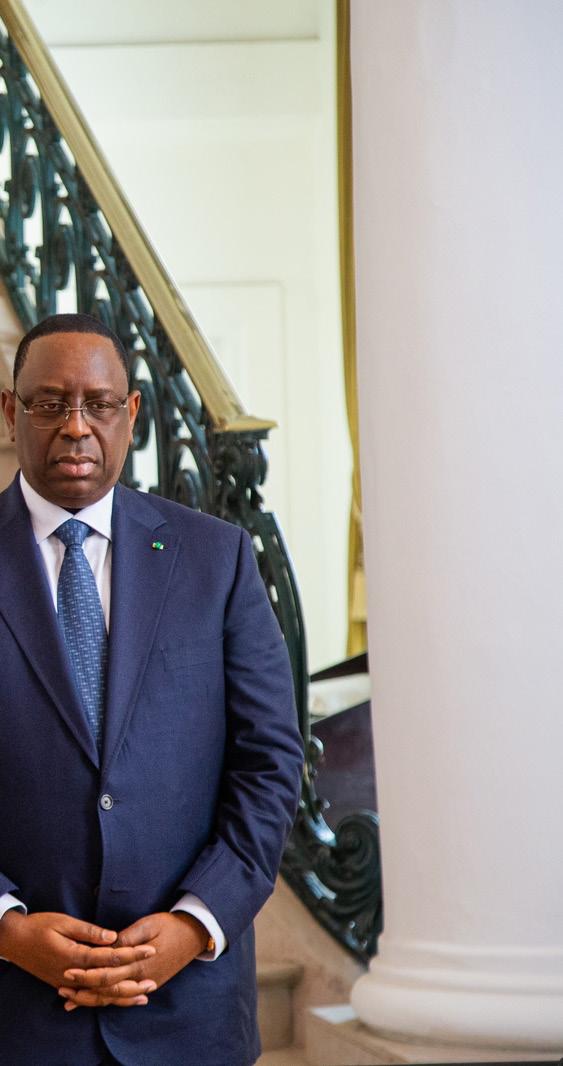
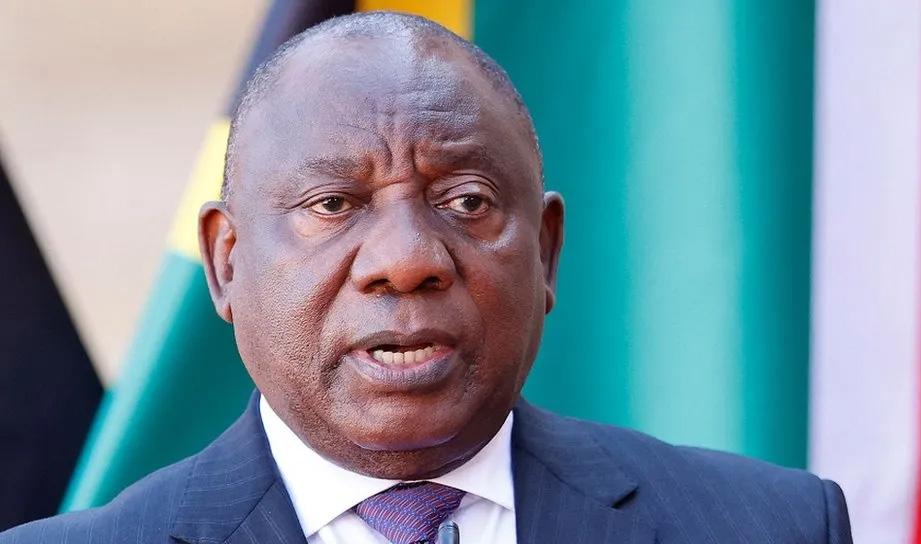
renewed confidence among African leaders and their electorate on the global stage. At the January 2024 Italy-Africa Summit, the chair of the African Union Commission called specifically for a “paradigm shift” in Africa-Europe relations.
While it is clear that the old order is out of date, there is not yet a clear successor. Indeed, the moment may be less a paradigm shift and more an “interregnum”: a period of transition between the collapse of an old hegemony and the establishment of a new one, during which the old powers lose their legitimacy and new ones have not yet gained enough power or acceptance to establish themselves. Regardless of the theoretical underpinning, policymakers in Europe and Africa find themselves navigating a new world, trying to find a path that protects and sustains their interests and values. And while many of these are shared, the risk is that we fall into a “beggar thy neighbour” approach whereby nations turn inward, pursuing their own domestic economic and strategic interests in a world where international cooperation on global challenges like climate change and pandemic preparedness are needed more than ever.
Europe’s responses to two major challenges—the Covid-19 pandemic, when it initially hoarded vaccines, and Russia’s invasion of Ukraine, when it took its focus from Africa and diverted resources and political attention to Ukraine—suggest this is a significant risk. Evidence of African countries courting Russia and other powers to meet their food, energy, and security needs show that this risk is not one-sided. There is, however, a significant opportunity
for the two continents to navigate these choppy waters together.
In February 2022, leaders of the EU and the African Union (AU) convened a summit to discuss the future of continental relations. European Commission President Ursula von der Leyen had previously stated that the relationship is a “partnership of equals,” whereby the two continents work together to tackle common challenges. That rhetoric has been accompanied by projectlevel commitments and financial pledges of leveraged private capital. However, the rhetoric has been met with much scepticism from African leaders, who are looking for the delivery of unfulfilled financial commitments and a meaningful seat at the global decision-making table.
African leaders, buoyed by the reality that they can choose who they partner with, are increasingly bullish about their role on the international stage. It is no secret that China has spent the past two decades building influence on the continent through diplomacy and major infrastructure investments, committing an estimated $153 billion between 2000 and 2019 to African public sector borrowers. India, Russia, Saudi Arabia, and Türkiye are also taking an increasing interest in the region through diplomatic, military, and economic cooperation.
At the same time, leaders such as former Senegalese president and 2022 chairperson of the AU Macky Sall and Kenyan President William Ruto have called for reforms in global economic governance to reflect Africa’s increasing role in the global economy—including successfully campaigning for an AU seat at the G20,
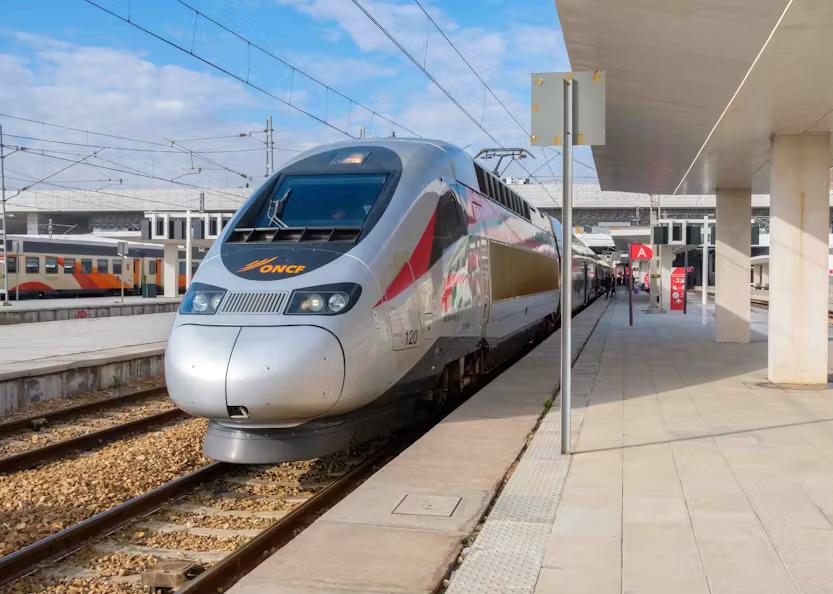
reform of the credit rating agencies, and shifts in the governance of the International Monetary Fund and the World Bank.
The scepticism of some African stakeholders is warranted. Trading relationships between Europe and Africa are highly imbalanced, echoing a postcolonial extractive model. In 2021, 68 percent of goods exported from Europe to Africa were manufactured goods. The majority (65 percent) of imports from Africa were raw materials and energy.
The February 2022 EU-AU Summit was strong on rhetoric, and headline commitments were significant. The EU pledged €150 billion in investments in Africa over seven years—a scale that is clearly framed to rival China’s Belt and Road Initiative. But African leaders, such as South African President Cyril Ramaphosa, expressed scepticism in light of previous commitments on climate finance that were not delivered. In a post-summit interview, Ramaphosa signalled that while Africa welcomed European investment, Africa would remain free to work with other
partners.
Less than two weeks later, the partnership faced a significant test. Russian President Vladimir Putin launched an invasion on Ukraine, a move that reignited the North Atlantic Treaty Organisation and the transatlantic alliance and led to unprecedented steps from EU member states—but illustrated the complexity of Africa-Europe relations. Four UN General Assembly votes—three condemning the actions of Russia and a fourth to expel Russia from the UN Human Rights Council—passed by majority, but in each case, more than half of the countries that abstained from the vote were African. European countries were taken by surprise over Africa’s perceived lack of support at the General Assembly.
In June 2022, then Swedish foreign minister Ann Linde told the European Council on Foreign Relations that she discussed the issue with her South African counterpart, comparing Europe’s support for the anti-apartheid movement with Africa’s lack of support for Europe over
Ukraine. African leaders then played an active role in 2023 by sending a presidential peace delegation to Kyiv. Notably, the nonalignment of many African countries positioned them to be neutral brokers in a peace deal.
Despite these challenges, there are significant potential benefits in getting the Africa-Europe partnership right. Both African and European policymakers are attuned to the risks of large numbers of young people without job opportunities and impacted by climate-induced weather events migrating in large numbers. As the European electorate focuses on domestic priorities and European leaders make the case for greater European sovereignty, policymakers should consider the potential mutual benefits of greater cooperation.
While geography, history, and politics will play a critical role in the future of this relationship, the starting point lies in the greatest resource of the two continents: their people. In Europe, the balance between the working-age population and those dependent on them
has been declining since 1985, and that trend is accelerating. As Europeans live longer, the cost of healthcare, pensions, and housing increases—costs that will be borne by younger generations that are fewer in number. Because there are fewer economically productive people to generate the necessary wealth and public revenues to support services, such as education, that are so critical to social mobility, many—young and old—are seeing fewer opportunities. This, in turn, is fuelling political nativism that is already hampering trade, migration flows, and international cooperation.
In contrast, Africa's long-term development plan (the AU's Agenda 2063) aims to create a pan-African single market, freedom of movement, and flagship infrastructure initiatives such as a highspeed rail network—a plan that mirrors the early ambitions of the EU. Yet, it is a continent with major challenges when it comes to conflict, poverty, and vulnerability to economic and climate shocks. The reality is that by working together, both continents can address the common challenges they face. The twenty-first-century economy requires people with technical skills and characteristics that can navigate rapid and constant change: resilience, determination, and an ability to collaborate. European countries, with their strong education systems and technical knowledge, lack sufficient numbers of young people with the dynamism to sustain the twenty-firstcentury economy. Africa has the youngest population in the world, a population that is increasingly urban and entrepreneurial. Countries, corporations, and cultural
trendsetters recognise the continent’s investment potential. But what Africa has in terms of young people and cultural dynamism, it lacks in terms of infrastructure and investment to develop technical skills and build effective markets. Europe has that capital, experience, and technical skills.
With the right frameworks and standards, Africa could supply the necessary labour to address Europe’s challenges with aging. Europe, on the other hand, could help provide the financial capital needed to support Africa’s human capital and hard infrastructure. But efforts to maximize the benefits of such a partnership need changes from both parties. Europe will have to reframe fractious debates on migration in ways that are both pragmatic and politically salient. To succeed, Africa will need to address issues such as the high cost of capital and low level of investment, governance service gaps, and market fragmentation.
Achieving this new outlook requires a reframing of the nature of the partnership, beginning with prevailing narratives that shape the public debate. Europe traditionally sees its role on the international stage in three ways: as a global
trade power and a provider of development aid; as a political and security actor, supporting regional security through bodies such as the AU; and as a normative power, supporting human rights and democracy, regional integration, and multilateral organisations.
In a world of increasing geopolitical competition, with transnational issues such as climate change, migration, and technology taking a prominent role, Europe has found itself in an increasingly complex environment. To break from these narratives requires a different approach, one that moves beyond summitry and institutional negotiations and builds networks of creativity, commerce, problem-solving, and trust. The aim is to take some of the major challenges—migration and remittance flows, climate change and the energy transition, the investment in and governance of global public goods, and the management of digital technology and regulation—and reframe the opportunities and potential for collaboration. This new approach can help both continents to navigate the current era of disruption and confusion and build a genuine partnership based on mutual interests and shared values.
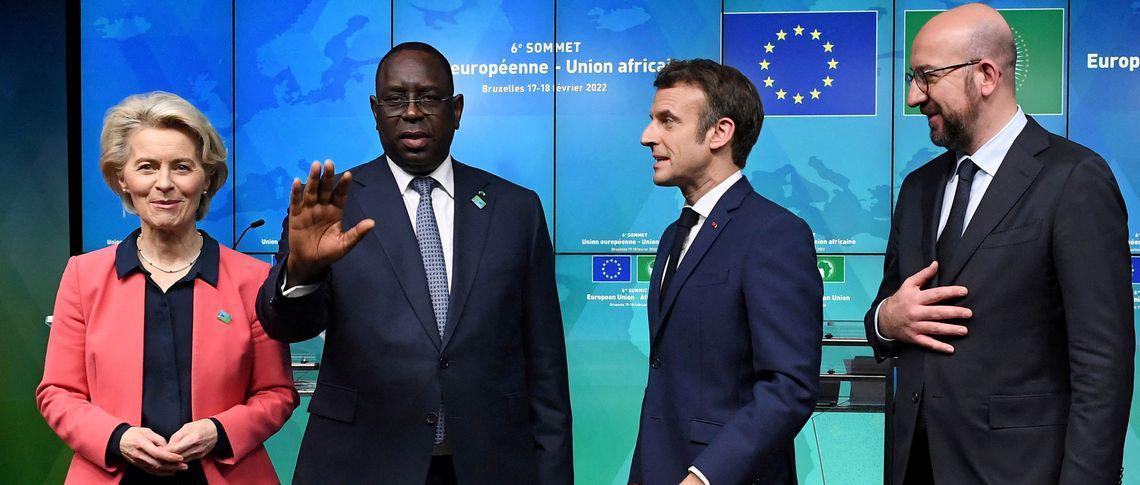
Jon Offei-Ansah explores the economic, political, and security implications of Niger, Mali, and Burkina Faso's decision to break away from ECOWAS, and potential solutions for restoring regional unity
THE Economic Community of West African States (ECOWAS) is facing a significant crisis as three of its 15 member countries – Niger, Burkina Faso, and Mali – have broken away to form a new grouping, the Alliance of Sahel States. This unprecedented move, marked by simultaneous meetings of ECOWAS in Abuja and the new alliance in Niamey on July 7, 2023, has significant implications for regional stability, economic integration, and geopolitical dynamics.
Niger, Mali, and Burkina Faso share common characteristics: they are former French colonies and are currently governed by military juntas. These similarities have driven them to form a unified front against ECOWAS, particularly in response to sanctions and threats of military intervention. The pivotal event
was the coup in Niger on July 26, 2023, where presidential guards detained President Mohamed Bazoum and General Abdourahmane Tchiani declared himself the leader. This coup led ECOWAS to impose sanctions and threaten military action, prompting Burkina Faso and Mali to form a mutual defence pact with Niger.
In a joint statement, the leaders of Niger, Mali, and Burkina Faso called their exit from ECOWAS a "sovereign decision" in response to the bloc's "inhumane" sanctions and its departure from the ideals of its founding fathers. They accused ECOWAS of being "under the influence of foreign powers" and failing to support their fight against terrorism and insecurity (VOA News). This alliance marks a shift towards a more self-reliant and region-specific approach to governance and security.
The departure of Niger, Mali, and
Burkina Faso from ECOWAS has significant economic implications. ECOWAS has been working towards regional economic integration, including the free movement of goods and services. The breakaway threatens this integration, as evidenced by border closures and sanctions following the Niger coup. The disruption of trade can lead to increased prices, shortages of goods, and economic instability in the region.
Before the political crisis, ECOWAS had been making strides towards the creation of a common currency to enhance economic stability and integration. However, the breakaway has complicated these plans. On February 11, 2024, General Tchiani of Niger proposed a common currency for the Alliance of Sahel States. This proposal reflects a desire for economic autonomy but also poses challenges in terms of implementation and

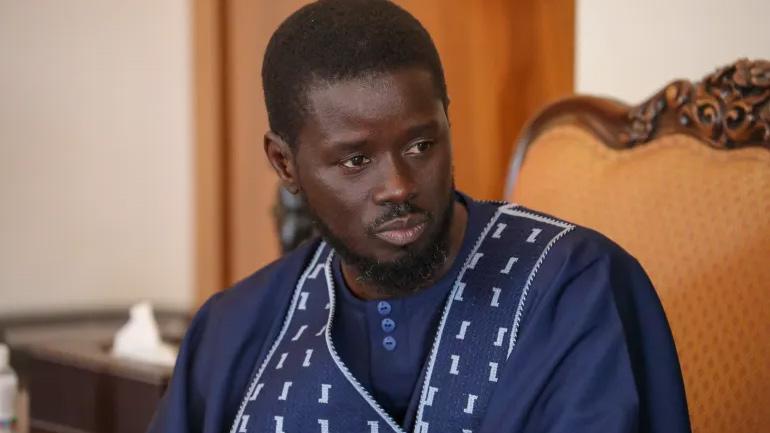
stability. The new currency could further fragment the region's economic landscape and undermine ECOWAS's long-term financial integration goals.
The economic consequences of this split extend beyond immediate trade disruptions and currency complications. Long-term investments and economic projects that were in the pipeline under the ECOWAS framework are now in jeopardy. Investors, both regional and international, rely on stability and predictability, which are currently at risk. The uncertainty surrounding the political and economic future of the Sahel region could deter investment and development, exacerbating the already precarious economic conditions.
One of ECOWAS's key achievements is the facilitation of free movement for its citizens, allowing them to travel, reside, and set up businesses across member states without visas. The departure of Niger, Mali, and Burkina Faso jeopardizes this arrangement. Restricted mobility could have severe consequences for citizens of the breakaway states, limiting their opportunities and disrupting social and economic networks. The loss of this freedom of movement could lead to increased migration hurdles and exacerbate regional tensions.
The ability to move freely across borders within ECOWAS has been a cornerstone of the bloc’s integration efforts, fostering not only economic but also social and cultural exchange. Curtailing this mobility threatens to isolate the breakaway states, potentially leading to a brain drain as professionals and skilled workers seek opportunities in more stable environments. This would further weaken the economic and social fabric of Niger, Mali, and Burkina Faso, countries
already grappling with significant internal challenges.
Moreover, the new restrictions could increase illegal migration and human trafficking as people seek alternative ways to move across borders. This would place additional strain on the region's security and humanitarian resources, complicating efforts to manage the socio-economic impact of the breakaway.
The breakaway of Niger, Mali, and Burkina Faso also has significant geopolitical and security implications. The Alliance of Sahel States represents a shift in regional power dynamics, potentially creating a parallel bloc with different priorities and strategies. This could lead to a realignment of alliances and increased competition for influence in West Africa. Furthermore, the security situation in the Sahel region, already fragile due to insurgencies and terrorist activities, could worsen as cooperation and coordination among states become more fragmented.
The Sahel region is plagued by various security threats, including terrorism, insurgency, and organized crime. ECOWAS has played a crucial role in coordinating regional responses to these threats. The formation of a separate alliance could weaken collective efforts and lead to a duplication of initiatives, thereby diluting the overall effectiveness of security operations. It could also embolden non-state actors who might exploit the divisions to further destabilize the region.
Moreover, the presence of external actors with vested interests in the region could complicate the geopolitical landscape. Countries like France, China, and the United States, which have strategic and economic interests in West Africa, may find themselves navigating a more complex
and fragmented political environment. This could lead to shifts in foreign policy and aid distribution, affecting development and security initiatives.
Recognising the gravity of the situation, ECOWAS has appointed Senegal's President Bassirou Faye as a special mediator to engage with the breakaway states. This move is part of a broader strategy to restore unity and confidence within the regional bloc. Engaging all parties in open and honest dialogue is essential to address their grievances and find common ground. This includes acknowledging the concerns of the breakaway states and exploring ways to integrate their perspectives into the broader ECOWAS framework.
Reassessing the impact of sanctions and considering alternative measures that do not exacerbate economic hardships can also help in rebuilding trust. Enhancing the capacity and legitimacy of ECOWAS institutions is crucial for managing regional crises effectively. This involves strengthening governance structures, ensuring transparency, and fostering greater inclusivity in decision-making processes.
Providing targeted economic assistance to address the root causes of instability and foster development can help mitigate the socio-economic challenges faced by the breakaway states. Promoting collaborative security efforts to combat terrorism and insurgency in the Sahel region is another critical step. This requires coordinated action plans, intelligence sharing, and joint military operations to tackle security threats. Strengthening diplomatic ties with external partners can also garner support for regional stability initiatives, ensuring that the international community plays a constructive role in resolving the crisis.
The decision by Niger, Mali, and Burkina Faso to break away from ECOWAS and form the Alliance of Sahel States marks a significant turning point in West African geopolitics. This move highlights the complex interplay of economic, political, and security challenges facing the region. While the breakaway poses immediate risks to regional stability and economic integration, it also underscores the need for ECOWAS to adapt and evolve in response to changing dynamics. Through inclusive dialogue, reassessment of sanctions, and strengthened cooperation, there is potential to address the underlying issues and restore unity within the regional bloc. The future of ECOWAS will depend on its ability to navigate these challenges and reaffirm its role as a key driver of West African integration and development.

The lessons from the recent elections in South Africa resonate beyond the country, offering valuable insights into fostering democratic resilience and inclusivity in a diverse political landscape, write Nyasha Mpani and Webster Zambara
SOUTH Africa’s crunch general election to elect a new National Assembly and provincial legislature in each of the country’s nine provinces held on May 29 coincided with the 30th anniversary of its democracy. These elections, crucial for determining the leadership of the country for the next five years, unfolded against a backdrop of significant challenges, including a high unemployment rate, increased extreme poverty, widespread corruption, diminished trust in public institutions, inadequate service delivery, and a faltering response to frequent power outages (locally referred to as load shedding).
The country also perennially wins the shameful tag of being “the most unequal society in the world”, a label whose roots can be squarely traced to the racial policy of Apartheid and colonialism that put the majority black population on the margins of the mainstream economy.
While the electoral process itself, organised by the constitutionally mandated and historically trusted Independent Electoral Commission (IEC), passed the national, regional and global standards of free, fair and credible elections, the plebiscite was also held in a peaceful and politically tolerant environment. Political parties and independent candidates openly and vigorously canvassed across the nation to lure voters.
However, in a historic twist since the end of Apartheid in 1994, no single party emerged as the outright victor to form a government. The African National Congress (ANC), Africa’s oldest political party and the once dominant liberation movement, failed to secure a parliamentary majority for the first time in 30 years, receiving only 40 per cent of the vote. This outcome
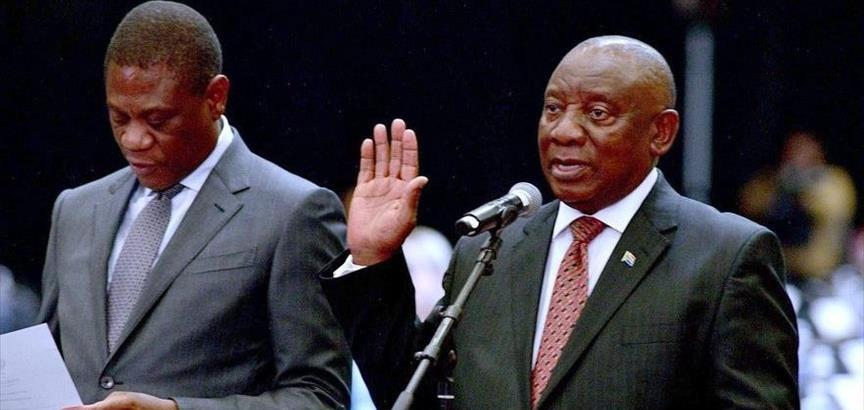
marked a definitive shift from the ANC's long-standing dominance in South African politics.
Notably, already established opposition parties such as the Democratic Alliance (DA) and the Economic Freedom Fighters (EFF) garnered significant support with 21 per cent and nine per cent of the vote, respectively. To complete the top four, the biggest surprise came from the six-month old uMkhonto weSizwe Party, simply known as MK and led by former ANC and South African President Jacob Zuma, which secured 14 per cent of the vote, thus replacing the EFF as the third largest opposition party. The MK, which, like the EFF, is another splinter from the ANC, became the unexpected disruptor in this election, further fragmenting the political landscape and signalling the end of 30 years of single-party dominance in postApartheid South Africa.
The 2024 elections also witnessed, for the first time, the rise of independent candidates in South Africa. They were allowed to run for national and provincial elections, a significant change necessitated
by a landmark ruling by the Constitutional Court in 2020.
It directed that the Electoral Act be amended, thereby enhancing South African voter choice with a more direct form of representation. The addition of independent candidates clearly shows how South Africa is moving for greater inclusivity and representation in its political processes.
The elections also marked a new chapter in how they are contested in a democratic South Africa. The amended Electoral Act made provision for three ballot papers.
The first relates to the 400 seats in the National Assembly, which have been split and contested on two ballot papers. The first 200 seats are contested by political parties only through the National Compensatory Ballot.
The second ballot allows both independent candidates and political parties to contest for the remaining 200 seats in the National Assembly through the Regional Ballot. Additionally, the Provincial Ballot enables independents and political parties to

run for seats in provincial legislatures.
These new changes, while necessary, presented new challenges, as observed during election day, with many voters struggling to understand the new system of three ballot papers.
Besides having no outright winner, voter turnout also plummeted to its lowest since the advent of democracy, with only 16.2 million out of 27.7 million registered voters participating. This decline reflects growing disillusionment among South Africans with the political process and governance.
South Africa's 2024 elections, with their record low turnout, serve as a critical wake-up call for the nation to engage in urgent civic education to inspire citizens to actively participate in the democratic process to help shape the country's future.
While the preliminary reports of several international observer missions gave the general election a thumbs up, the election itself had its own challenges as evidenced by the unprecedented number of litigations before and after, as well as technical glitches with voting machines, delayed polling materials and staff, and insufficient voter education on the new ballot format. Despite these hurdles, the maturity of South Africa's democracy was on display through transparent electoral processes and a generally peaceful atmosphere.
The MK party has again taken the IEC to court in the post-election period, citing irregularities and manipulation in vote counting, and went on to boycott the swearing-in of the Seventh Parliament which not only elected the new Speaker and Deputy Speaker of the House but went on to elect Cyril Ramaphosa for his second and final term as the country’s president.
Despite the disputations, the ANC's acceptance of electoral defeat underscored a commitment to democratic norms, contrasting sharply with trends in other nations within the region and outside where political transitions are blocked, often leading to unrest.
Gender dynamics also played a significant role, with a majority of IEC staff and presiding officers being women. This representation highlighted women's pivotal role in ensuring free and fair elections.
Moreover, the establishment of the Women's Election Mechanism for Peace

(WEMP) marked a proactive effort to enhance female participation in electoral processes and conflict prevention. WEMP's deployment of 300 women peace monitors across key provinces such as Kwazulu Natal, Western Cape, Eastern Cape, Limpopo and Gauteng exemplified women’s agency, meaningful participation and commitment to inclusive and electoral processes.
Unfortunately, there was a slight drop in women’s representation in the national assembly, comprising 174 women and 226 men (down by three percentage points from the previous parliament). As a result, South Africa dropped from 12th to 22nd on the global ranking of women’s political participation. There is however solace in that both the Speaker and the Deputy are women.
While observing the elections in Cape Town and its surroundings, we also came face-to-face with spatial disparities, reminiscent of Apartheid-era divisions, easily reflecting in the distribution of voting stations, with affluent suburbs boasting more stations than underserved townships. This observation underscores ongoing challenges in achieving electoral equity and inclusivity.
The Ramaphosa-led Government of National Unity (GNU), now including his party’s political foes in the DA, inherits deep public dissatisfaction with the country’s overall direction, 30 years into
democracy. Afrobarometer's 2022 survey results indicate that more than eight in 10 (83 per cent) believe the country is heading in the wrong direction, while 71 per cent characterise the country’s economic condition as bad.
The data further indicate that most South Africans (93 per cent) lament the previous government's failure to rein in inflation, create jobs (90 per cent), address income inequality (89 per cent), and manage the economy effectively (81 per cent). This is the state of affairs that the GNU has inherited, and will need to confront and address.
South Africa's 2024 elections serve as a significant case study for the region, showcasing best practices in electoral management and the critical role of independent election management bodies and the justice system in upholding democratic principles without interference. The lessons from these elections resonate beyond South Africa, offering valuable insights into fostering democratic resilience and inclusivity in diverse political landscapes.
South Africa remains a bastion of democracy within the Southern African Development Community (SADC) and the rest of Africa; and as other countries are yet to conduct their elections it is important that they draw lessons and refine their democracies for the good of their nations.

AS South Africa reels from the outcome of the recent elections that saw the ANC having to share power for the first time in 30 years, women in the country have added their voices to the call to “reset and rejuvenate governance”. We publish their statement below
WE, a coalition of individual women and women’s organisations from across South Africa, declare that women have been the majority of the electorate in South Africa throughout our 30 years of democracy, and account for 55.25 per cent of the 27,672,264 registered voters in the 2024 elections. Women achieved the highest voter turnout, with almost two million more women voting than men, yet
there has been a three per cent decrease in women’s representation in the National Assembly, from 46 per cent to 43 per cent.
As women, we continue to raise our voices during this watershed moment in the life of our country. The election result is an opportunity to reset and rejuvenate governance.
The first sentence of South Africa’s Constitution calls on us to recognise the injustices of our past, arising from
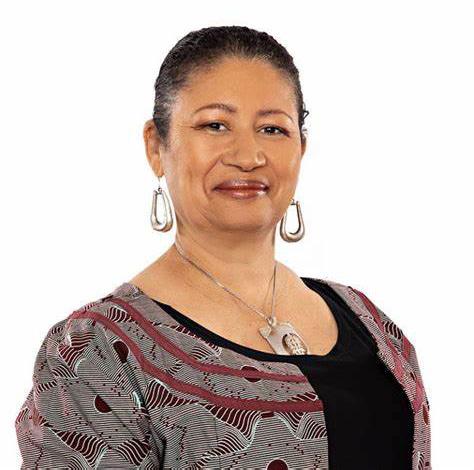
Apartheid’s oppression of people who were Black (‘African, Indian and Coloured’) while privileging those who were white. Apartheid spatial planning continues to trap the vast majority of South Africa’s people in poverty and inequality, whilst a minority continues to own SA’s land and wealth.
These systemic and structural fault lines result in women bearing the brunt of precarious employment, unemployment and climate change. This seventh administration needs to ensure economic policy takes account of women’s unpaid and invisible contributions to social reproduction.
The election results reflect the will of the people. The people, and women in particular, have provided a mandate for the sharing of power. South Africa’s government of national unity must focus on implementing South Africa’s Constitution, to transform people’s lives, especially women and people who are marginalised for being poor, living in rural areas, having disabilities or for being LGBTQIA.
The Government of National Unity/ Coalition must therefore be inclusive, adopt an intersectional approach, and prioritise the well-being of all, but particularly the well-being of women and gender non-conforming persons, people living in rural areas, children, the elderly and those with disabilities, as well as create an environment in which our youth can grow and participate to their full potential.
The political parties have been given a mandate to exercise leadership that is responsible, accountable and ethical, and that enables the country to move forward in a more united and reconciled way, in which the President and political parties put the citizens and country first. They are mandated not to regress on already hardwon rights, but to move us forward in ways that can translate the rights promised by our

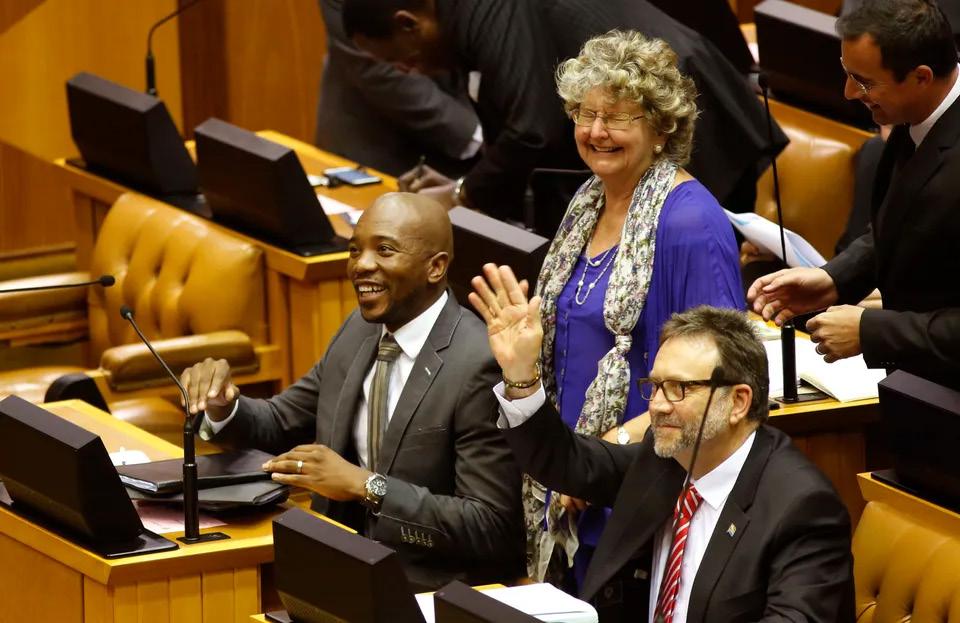
Constitution into improvements in our lived realities.
The majority voice of women must translate into equal opportunities for all and bold and ambitious, accelerated and transformative actions to ensure the enjoyment of human rights, development, and peace and security for women and girls in all our diversities.
Women of South Africa therefore declare that they will not tolerate:
• Anyone or any party in the legislature and executive that has no respect for the rule of law, or promotes bigotry, including racism, sexism, ageism, homophobia or xenophobia. (See Constitution Article 2, Sec 9 Equality Clause)
• Any party that has failed to declare its commitment to and respect for a constitutional democracy.
• Any party that does not support the human security of all, and women’s security in particular.
• Any party that tries to roll back gender equality gains, e.g., in the workplace, rural women’s rights to land, and socio-economic rights, or attempts to introduce policy that is in any way sexist and patriarchal.
• The continued exclusion of women from the economic landscape.
• Women therefore demand that the Government of National Unity:
• Ensures that its members and public representatives deployed are based
on upholding Constitutional values, principles, priorities and ethical behaviour; including transparency, accountability and public participation.
• Ensures that the incumbents of the next administration are competent, selected on merit, beyond reproach and inclusive of women and youth in strategic positions.
• Ensures that the socio-economic commitments are gender sensitive, transformative and developmental, serving the needs of poor people and rural communities.
• Ensures that the National Strategic Plan on Gender-based Violence and Femicide and the National Action Plan on Women
• Commits to the equal representation of women in all their diversity in the National Assembly, Provincial legislatures, Cabinet, Executive Council, and the Presidency.
• Ensures women's equal, effective, transformative participation in all structures and processes
• Continues to give effect to South Africa's regional and international commitments to uphold a human-rights, rules-based system, focused on global peace and cooperation, in all multilateral and global institutions, including the International Court of Justice and International Criminal Court.
As women of South Africa, we have demonstrated a rich history of working across parties, as we effectively did as the Women’s National Coalition in the run-up to the first democratic elections in South Africa in 1994. Thirty years down the line we are recommitting to shaping the nature of democracy in our country.
South African women contribute to families and society, including as workers, employers and job creators. The GNU/ Coalition can create an inclusive and growing economy if it recognises the value of this work to reproduce a society based on the wellbeing of all its people. We therefore appeal to our political parties to exercise the necessary maturity and vision to collectively lead our nation to peace, stability and prosperity for all.
We are supportive of the call to convene a Multi-stakeholder National Dialogue in the first quarter of the seventh Administration in 2024 as a constructive way of pulling the country together, collectively developing strategies to deal
years on we are
‘ ’
Peace and Security are implemented and resourced.
• Considers measures for socio-economic protection which should include the Universal Basic Income Grant as a form of solidarity economy, while at the same time urgently implementing inclusive economic growth measures that prioritise job creation towards productive self-reliance and active citizenry.
with South Africa’s socioeconomic and social cohesion challenges, and for ensuring that peace and stability prevail.
We make this submission, mindful that our own task is to hold those in power accountable for their decisions and omissions, and to organise ourselves into a women’s movement that can support the continued pursuit of gender equality and human security for all.

Political parties should be penalised for not meeting gender parity in their leadership structures and in the candidates nominated to run for constituency-based seats in the National Assembly, argues Shannon Arnold
ZIMBABWE’S democracy is in jeopardy, yet again. The disputed August 2023 general elections were widely criticised by international observers for falling short of regional standards.
Despite facing an unfair playing field and repressive political environment, the largest opposition party, the Citizen’s Coalition for Change (CCC), managed to prevent the ruling ZANU-PF from retaining its two-thirds majority in parliament. However, these precious gains were lost through the recall of numerous CCC lawmakers.
The once vibrant CCC now lies fractured and hollowed-out, with various figures claiming to control the party following the exit of its founder and leader, Nelson Chamisa. ZANU-PF gained the most from the recalls and subsequent by-elections, an absolute majority in parliament.
So, it is not unreasonable to assume it is behind the commotion, especially given the readiness of the courts and election commission to rubber stamp the process. As a result, parliament, one of the last vestiges of democracy in Zimbabwe, has regressed to its former pacified state, echoing the country’s turbulent political past.
Zimbabwe’s democratic decline is hurting women’s involvement in politics. The recalls were aimed at weakening the opposition and entrenching political power, but women politicians got caught in the crossfire.
Out of 27 CCC MPs recalled from the National Assembly, 15 were women. However, only two of these held direct constituency-based seats, while the remaining 13 were appointed from a party list through the gender quota system.
Those behind the recalls in the CCC claimed they were protecting the party’s internal democracy by removing candidates allegedly imposed by Chamisa. In early March the recalled gender quota MPs

were replaced by those aligned with anti-Chamisa factions, illustrating that “quota women” are not seen as genuine representatives, but tools to be manipulated in male-dominated political agendas.
Additionally, none of the by-elections for the vacant constituency seats were won by women, which is unsurprising given that only four out of the 47 candidates were women. These developments are part of a broader trend marginalising women’s voices in politics, despite the country’s seemingly progressive gender laws.
Zimbabwe is an autocracy with some democratic window dressings. This entails creating just enough space for dissent, while simultaneously shrinking that space by manipulating institutions and laws and using violence (as well as the threat of violence) to squash political competition and prevent regime change.
Some authoritarian countries use “gender-washing” to distract attention from persistent draconian practices. Zimbabwe is no stranger to this tactic. The government may advance women’s rights and women’s political inclusion through international frameworks and national laws, but these do
not meaningfully challenge the political, social, cultural and economic factors which undermine the realisation of gender equality goals.
A repressive political environment prevents gender equality from being realised in real terms. Illiberal regimes tend to be more violent, which extends from state-sponsored violence in public spaces to domestic violence in the home, creating an environment in which gender discrimination thrives.
In Zimbabwe, violence against women in politics (VAWIP), be that in-person or online, deters women from standing for public office. This violence stems from a broader picture of repression aimed at shrinking the democratic space, and is connected to a patriarchal backlash against women’s increased representation in politics.
Key to Zimbabwe’s gender-washing project was the introduction of a temporary gender quota to parliament in the 2013 Constitution to encourage women’s political representation. The quota ensured that 60 additional proportional representation (PR) seats reserved for women were added to

the 210 first-past-the-post (FPTP) seats in the National Assembly; and that out of the 80 seats in the Senate 30 were reserved for women as well as one out of the two seats for people with disabilities.
As such, between 2008 and 2013, women’s representation rose in the National Assembly and Senate from 14 per cent to 32 per cent and from 33 per cent to 48 per cent, respectively. Initially, the National Assembly quota was supposed to be applied to the first two parliaments, but in 2021 women’s groups successfully lobbied the government to extend the provision for another decade.
Nevertheless, the results are not much to write home about. The quota has had the opposite intended effect on women’s overall political participation, as less women are being elected for direct FPTP seats. Women’s representation in the National Assembly has not increased as much as expected; in fact, it has steadily declined by one or two percentage points with each election cycle.
In 2023, women representatives made up just 30 per cent of the National Assembly. This might not seem significant, but consider this: only 10 per cent of the FPTP elections were won by women, meaning that if the quota was removed tomorrow, there would be less women representatives in parliament than in 2008.
Parties believe that the quota makes it unnecessary to further include women as candidates for constituency seats. In the 2023 elections, political parties did not field enough women candidates to make gender parity a reality. Election observer missions noted the decline in women candidates nominated for the presidency and constituency elections compared to the 2018 elections, citing factors such as excessively high candidate nomination fees and patriarchal beliefs.
The idea behind the quota is that women will use their seats at the table to advance gendered issues, which are often neglected. This is certainly the case; countries that adopt gender quotas also tend to pass more progressive laws and policies which expand and protect women’s rights.
However, policymakers also expect women’s increased representation to encourage systemic changes that empower women in all facets of life, be that at home or in the boardroom. Gender quotas can’t do all this heavy lifting on their own; they
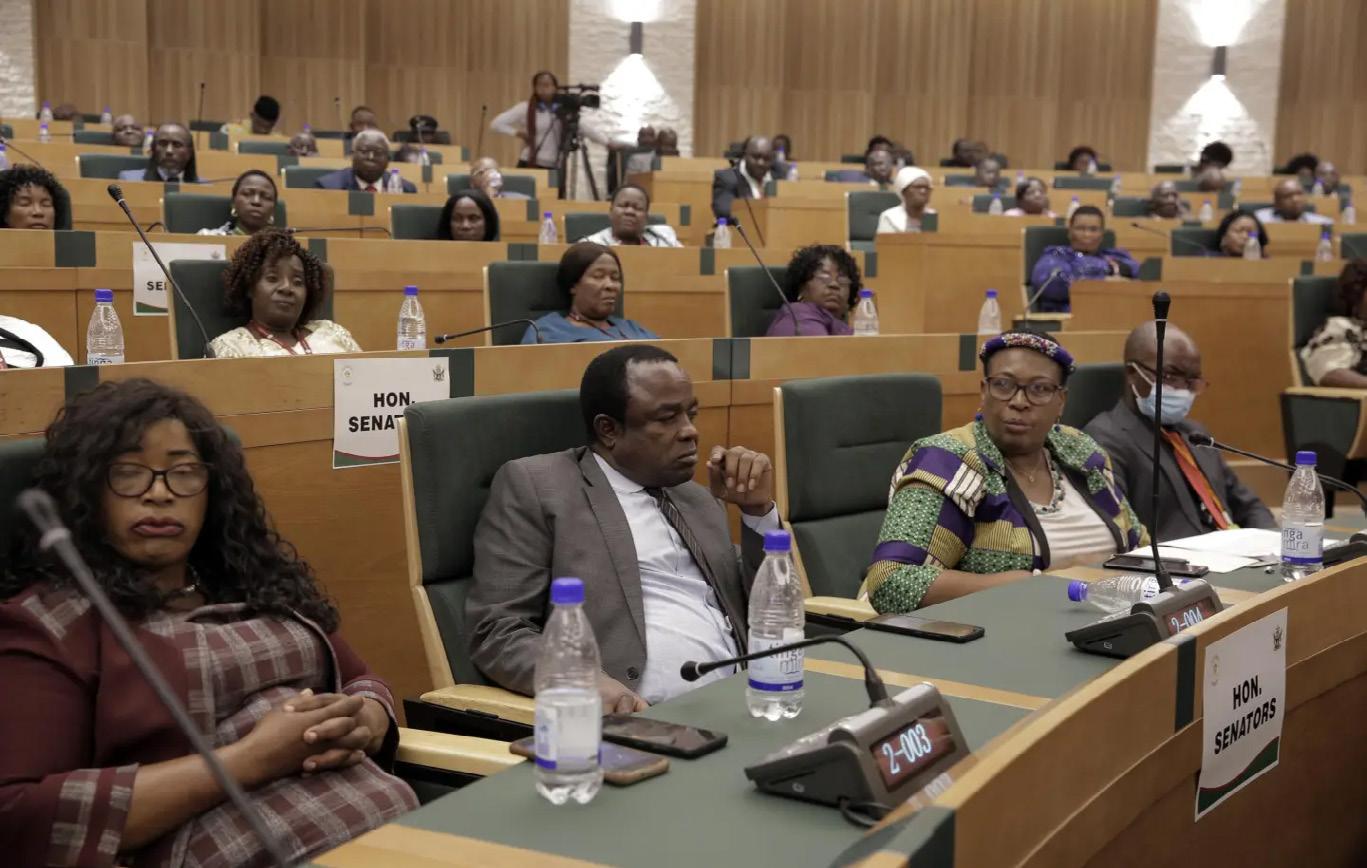
are a necessary but insufficient measure for addressing gender inequality.
The Zimbabwean government and political parties have not demonstrated the political will to encourage these changes, effectively rendering the quota a boxticking exercise. Without further measures to encourage attitudinal, cultural and social change, women representatives are left vulnerable to backlash from party members, their opponents and the public – ultimately discouraging, rather than encouraging, women’s participation in politics.
Outside of discrimination within party structures, women are also discouraged from entering politics because of the threat of violence. During the 2023 elections, a number of local NGOs reported human rights violations during the election period.
For instance, in the month before the polls, 10 opposition women activists were reportedly attacked and stripped naked by ZANU-PF supporters, and two opposition women activists were allegedly kidnapped while door-to-door campaigning. Importantly, violence was also directed against women linked to the ruling party. A consolidated report on violence during the 2023 elections demonstrates that seven rapes were reported, four of which were in aggravated circumstances.
VAWIP is also online, which is much more pervasive. Social media has become a critical tool for political agency, but it also exposes women to emotional and verbal online abuse in the form of sexualised attacks, body shaming, attacks on them for
failing in their “duties” as mothers, ageism and account hacking.
A stark example of this is the experience of former Masvingo mayor, 25-year-old Shantiel Chiwara, one of the recalled CCC local authority representatives. During her campaign for re-election, trolls alleged that Chiwara had sexual relations with male leaders in order to get the mayorship and members of her own party referred to her as a “little girl”.
Zimbabwe needs to move from gender-washing toward addressing gender discrimination on a deeper level. The government recently introduced a new National Strategy (2023-2030) to address GBV which must be made publicly available.
Both online and offline gendered electoral violence require national attention, and in particular gendered online harassment should be made punishable by law. The police should act on reports of abuse and violence targeting women politicians on both sides of the political divide.
Political parties should be penalised for not meeting gender parity in their leadership structures and in the candidates nominated to run for constituency-based seats in the National Assembly. Finally, the Zimbabwean government and political parties are urged to fulfil their regional gender equality obligations by fully implementing all gender equality provisions in the Constitution.

Young activists demanding accountability and a fair distribution of economic burdens to release them from the already crippling economic hardships have drawn parallels with Kenya’s own history of popular demonstrations, writes Halima Ahmed
IN the heart of Nairobi, the youth of Kenya, ignited by a sense of injustice and driven by a spirit reminiscent of past struggles, took to the streets in June to protest against the 2024 Finance Bill (subsequently withdrawn by President William Ruto). This legislation, purportedly aimed at economic reform, had been met with fierce opposition from the public and, more so, from the Millennial Generation and Generation Z, for its perceived bias towards the political elite and its detrimental impact on the general public and the future of the nation.
Drawing parallels with the political events of 1992, these protests symbolise not just a rejection of economic oppression but a reaffirmation of the power of collective action and democratic engagement. These protests were a reminder that the current state of socio-economic affairs in the country is fast dwindling due to budgeted corruption and political greed.
The 2024 Finance Bill, drafted by the government under the guise of economic austerity, sparked widespread discontent across Kenya. At its core are provisions that critics argue disproportionately burden ordinary citizens while offering tax breaks and concessions to wealthy corporations and individuals.
Among the contentious measures are increased taxes on essential goods and services, cuts to social welfare programmes, and reduced public sector funding, all of which threaten to widen the gap between the rich and the poor.
The youth, who constitute a significant proportion (65 per cent) of Kenya's population, have emerged as the vanguard of resistance. Organised under the banner of digital activism and freedom of speech, they have mobilised through social media campaigns on X (formerly Twitter), TikTok and Instagram platforms, street protests and occupations of public spaces, notably the vicinity surrounding the parliament in Nairobi.
Inspired by the earlier generations that fought for Kenya’s multi-party movement, the 2010 Constitution and even the independence of the Republic from British
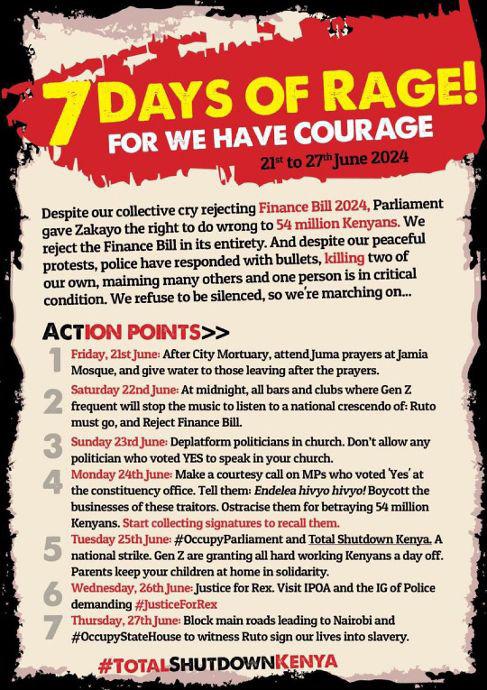
rule back in the 1950s and early 1960s, we can draw parallels with Kenya’s own history of popular protests. These young activists are demanding accountability and a fair distribution of economic burdens to free them from the already crippling economic
hardships the public is dealing with.
In order to understand the significance of these protests, one must revisit Kenya’s political landscape in 1992. The year marked a pivotal moment in the country’s history as multi-party democracy was

restored after decades of single-party rule. The clamour for change was driven by a diverse coalition of activists, intellectuals and ordinary citizens who sought to dismantle the entrenched system of authoritarianism and economic inequality.
The parallels between 1992 and 2024 are striking. Both periods reflect a deepseated dissatisfaction with governance that prioritises the interests of a privileged few – the political elite – over the needs of the masses.
In 1992, the rallying cry was for political freedoms and democratic reforms; in 2024, it is for economic justice, equitable distribution of resources, an end to corruption and “budgeted national theft” by the ruling party and its members. The spirit of resistance and resilience that characterised the struggle for democracy in the early 1990s serves as a powerful inspiration for today’s youth protesters, reminding them of the transformative potential of collective action.
Central to the protests is the role of Kenya’s youth as catalysts for change. Unlike previous generations, who often looked to established political figures for leadership, or were too scared to fight for themselves under the dictatorship of President Daniel Moi, today’s youth are leveraging their digital savvy and grassroots networks to challenge the status quo.
The youth are speaking up against the gross misconduct of their representatives, calling them out on their abuse of power and fixing the cognitive dissonance about the parliamentarians assuming that their election was due to their party ticket as opposed to being elected by the people. Social media platforms such as X and TikTok have become vital tools for mobilising protests, disseminating information and calling for support both domestically and internationally.
Moreover, the youth-led protests are not merely reactive but proactive in nature. Beyond opposing the Finance Bill, demonstrators are advocating for alternative economic policies that prioritise social welfare, sustainable development and inclusive growth.
They are demanding that the IMF’s involvement should be put to bed, lest the country returns to the 1980s when the Bretton Woods Institutions critically crippled African nations with the now discredited Structural Adjustment Programmes. Their demands reflect a nuanced understanding of economic issues and a commitment to shaping Kenya’s

future in line with democratic principles and social justice.
In response to the protests, the Kenyan government adopted a defensive stance, dismissing demonstrators as agitators and warning of potential unrest. However, such rhetoric only served to galvanise the protesters, bolstering their determination to hold authorities accountable for policies that exacerbate socio-economic inequalities.
Public discourse surrounding the Finance Bill also intensified, with intellectuals, economists and civil society organisations weighing in on its potential impact. Critics argue that the bill, if enacted, would undermine efforts to reduce poverty, stifle economic mobility and perpetuate a cycle of dependency on foreign aid and loans. These concerns resonated widely among ordinary Kenyans, many of whom feel disenfranchised by a political system that prioritises the interests of powerful elites.
As Kenya stands at a crossroads in 2024, the lessons of history offer valuable insights into the path forward. The protests
In 1992, Kenya embarked on a journey towards political pluralism and democratic governance. Today, the challenge lies in translating those political gains into tangible socio-economic benefits for all Kenyans. The youth-led protests represent a critical juncture in this ongoing struggle, signalling a determination to reclaim the promise of a more just and equitable society.
The protests against the 2024 Finance Bill resonate deeply with Kenya’s historical struggles for democracy and social justice. Inspired by the events of 1992, when Kenyans demanded political freedoms and accountability, today’s youth are mobilising against economic policies that threaten to deepen inequality and impoverish the most vulnerable. Their resistance is not only a rejection of unjust laws but a reaffirmation of the power of collective action and civic engagement in shaping a more equitable future.
As youth disaffection continues to unfold, it serves as a reminder that the struggle for economic justice is inseparable from the broader quest for democratic governance and human dignity. Whether
against the Finance Bill are not merely a moment of dissent but a clarion call for systemic change. They underscore the importance of active citizenship, civic engagement and education, and the safeguarding of democratic institutions against encroachments by vested interests.
Kenya embraces the lessons of its past and charts a course towards inclusive development remains to be seen. What is certain, however, is that the voices of the youth will continue to echo through the corridors of power, demanding a fairer and more prosperous future for all Kenyans.

The patterns of the chain of events that brought about the current situation in Kenya can be found in Nigeria, says Toyin Falola
THE Kenyan situation quickens the spirit of millions about the state of Nigeria; the similarities in these regrettable developments and how Nigerians could predictably respond.
Kenya is currently undergoing a tumultuous period marked by economic hardship amidst inflation and high tax levies in addition to a loss of trust in the government's ability to push for the envisioned Kenyan Dream that formed the basis of political campaigns of President William Ruto and was a major factor that brought him into power.
It has often been the trend that politicians, especially African ones, would ride on public sympathy and emotions but later without consideration of their welfare or needs. No doubt, Ruto understood the game and explored its opportunities by campaigning on the very needs of the people but leaving them hanging after the elections.
Since September 2022, when he became president, Kenyans have had many reasons to question their choice and bemoan their plight as the nation crumbles under economic crises and poverty. And Ruto is still squeezing life out of them with inconsiderate taxes.
The worsening state of the nation, with no end in sight, pushed Kenyans in their numbers out on to the streets, demanding change and a review of the tax law, among many others. There have been heavy clampdowns by government forces, arrests and state-sponsored persecutions to deter the youth protesters.
A quote on a placard stated: “It is not teargas but the air of change”. This reminded me of the EndSARS protest and crisis in Nigeria and how the people were driven to the wall in fighting their battles. The situation in Nigeria back then and those in Kenya currently are not far apart in similarity.
But my concern is that the state of Nigeria has grown far worse than what it
was that pushed the Nigerian youth to the streets in 2020. Without being a prophet of doom, the patterns of the chain of events that brought about the current situation in Kenya can be found in Nigeria.
For a decade, the Nigerian economy has been heavily impacted by the nation's rising debt levels, causing untold hardships, recessions, and grave concern among policymakers and citizens alike. This mounting debt burden has put immense pressure on the nation's finances, leading to higher debt servicing costs that consume a substantial portion of government revenue.
In the second quarter of 2023 alone, Nigeria's public debt, which included both external and domestic, stood at N87.38 trillion ($113.42 billion) from N49.85 trillion ($ 108.30 billion) in the first quarter of the same year, indicating a growth rate of 75.27 per cent on a quarter-on-quarter basis.
The figure continues to rise by the day.
The Kenyan economy is under the same stress and burden of accumulating debt, which increased from $63.2 billion in 2022 to $76.6 billion in 2023. As of 2024, the national debt was $78.9 billion. The country's external debt accounts for 54.7 per cent of its total debt, and the depreciation of many African currencies against the dollar makes repayment quite difficult.
Like Nigeria, the debt has caused a major crisis in the country's economy. Apart from this, an underemphasised factor that is likely to push Nigeria into anarchy, as experienced in Kenya, is the issue of corruption. The two most recent cases are the charges levelled against erstwhile Central Bank of Nigeria Governor Godwin Emefiele and Kogi State Governor Yahaya Bello.


The Corruption Perception Index of Transparency International in 2023 put Nigeria as the 150th most corrupt out of 180 countries as of 2023. In 2022 alone, not less than 32.2 per cent of Nigerians must have paid substantial bribes to public officers without taking into consideration backhanders offered to other officials and law enforcement agencies.
Although better than Nigeria to some extent, Kenya still ranks 123rd out of the 180 least corrupt countries in the world. Not less than 45 per cent of Kenyans had paid bribes to public officials before the end of 2023. The most recent reports and issues lie within the judiciary, the law enforcement agents and the public procurement of substantial items and services.
The two countries had thought that imposing taxes would alleviate these several debts and cashflow problems to revive the economy. They ended up killing themselves, as the masses have been taxed until they are almost unable to breathe.
The Nigerian government increased VAT from five per cent to 7.5 per cent at a time the poverty rate was four out of 10 people in the country in 2020. Many other fiscal measures have also suggested the government’s insensitivity, some of which have been faced with head-on public resistance in the past few years. The

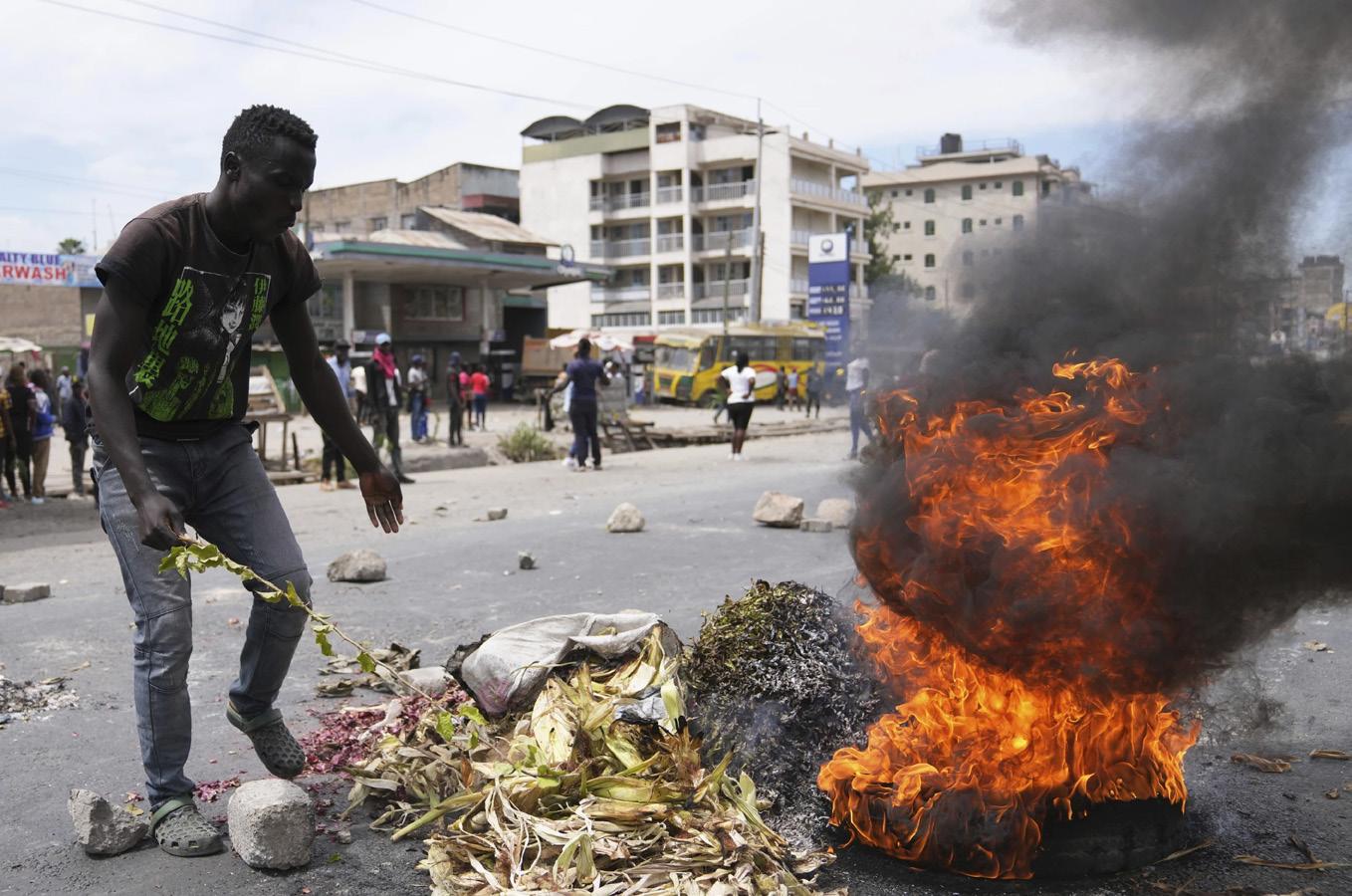
increase in electricity tariffs, proposed but suspended cybersecurity tax, and a load of economic policies in recent times show the government's insensitivity.
Similarly, the Kenyan government is probably convinced that taxation of hungry people would resolve its debt problems and other economic restrictions. In 2023, the housing levy of 1.5 per cent of employees' income was reintroduced. The government also proposed an increase in petroleum VAT from eight per cent to 16 per cent, which could have affected all aspects of the people's welfare, especially the cost of living and transportation.
In recent times, despite the economic hardship and the series of debts that both countries face, government officials still lavishly spend public funds without conscientiousness. From hiring private jets, despite the high maintenance of flights, the officials have added to the various government convoys’ expensive SUVs that took a fortune to buy and maintain.
Being this wasteful, it is frustrating for citizens who have to pay to salvage the situation when resources could be used prudently. Nigeria and Kenya run one of the most expensive types of government, and their people barely survive in the economy.
In Nigeria, when the uncomfortable lifestyle, cost of living, police brutality and other injustices increased, the youth rose to action in the 2020 EndSARS protests, insisting on the end of the brutality of the police at first and asking for governmental accountability. It is normal for resistance
to be heralded when the people are pushed to the wall and when they are left with nothing. In 2020, there was complete chaos in the country until the government succumbed to the anger of the people.
The situation in Kenya that has brought about the 2024 protests is not as much as the various issues faced by Nigerians in the past months. The rate of insecurity has increased, with different individuals turning it to ventures and established crime systems.
The price of basic food has become unaffordable for the people. Only a few now can buy tomatoes as the price has increased by not less than 400 per cent from last year. The price of garri, which is regarded as the most basic food for consumption, also increased by more than 300 per cent last year. The poverty rate is increasing, making people aggressive, apprehensive and depressed.
These issues are coupled with others, including injustice, brutality, corruption and insensitive government policies, gradually pushing the people to the wall. The current Nigerian problems transcend what brought the youth out on the streets in the 2020 EndSARS protests. It is more than the issues faced by Kenyans that brought about the 2024 chaos.
The Nigerian government must take learning curves from these instances before the people reach a point of full resistance that no level of governmental intimidation would ever restrain their resistance.
Ethiopia, without direct access to a sea port for the last 30 years, is entangled in a dispute with Somalia over Addis Ababa’s deal with Somaliland – which is not internationally recognised – to lease 20kms of Red Sea coast for 50 years. Aweis Sheik Yonis looks at how the two countries are trying to navigate the stormy seas
ON January 1 this year, the government of Ethiopia and Somaliland penned a Memorandum of Understanding (MoU) of partnership and cooperation in Addis Ababa. Signing on behalf of Ethiopia was Prime Minister Abiy Ahmed while Musa Bihi Abdi did the same as leader of Somaliland, an entity that has not been recognised as an independent state by the international community.
The deal leases close to 20kms of the Red Sea coast to Ethiopia for 50 years and gives Addis Ababa unfettered access to construct a military base and commercial hub. In return, Ethiopia is expected to acknowledge Somaliland as an autonomous and independent state, among other things. The government of Somalia argues that this is militarily and commercially disadvantageous to the interests and priorities of the country and the people of Somalia.
Since Eritrea officially seceded from Ethiopia in May 1993, after years of a war of independence, the country has been a landlocked state. This means that for the last three decades Ethiopia has had no direct access to a port which it once enjoyed.
With the country currently witnessing an economic renaissance, the need for sea access has become dire. Not surprisingly, Ethiopia has decided to engage with Somaliland, much to the chagrin of Somalia.
Indeed, Somaliland’s desperate quest for legitimacy is a major reason for the signing of the Red Sea deal. Also, Somaliland’s security needs, coupled with economic aspirations, further augments the significance of the MoU. Ever since declaring its independence in 1991, Somaliland has made multiple attempts through the instruments of the presidency
and bilateral engagements for state recognition but to no avail.
The MoU has now ignited a diplomatic row between Ethiopia and Somalia. Mogadishu argues that Somaliland is not an internationally recognised state and therefore the MoU is not legally binding, making it null and void.
According to the Montevideo Convention on the Rights and Duties of States, a state must have a permanent population; defined territorial boundaries; a government; and an ability to enter into agreements with other states. The government of Somalia has consistently put forth the solid argument that Somaliland fails to meet the criteria envisaged in the Montevideo Convention.
Moreover, the Somali government has contended that Somaliland has never passed the internationally laid down political and legal legitimacy tests to qualify as an independent state capable of transacting and entering into binding contracts.
In July 2020, Somaliland and Kenya initiated a bilateral trade partnership that
led to the Kenyan government opening a Liaison Office in Hargeisa in Somaliland. Somalia recalled its ambassador in Kenya and simultaneously expelled Kenya’s chief diplomat in Mogadishu. Once again, Somalia questioned the legitimacy of Somaliland’s statehood.
Again, Somalia contends that the leasing of 20km of the Red Sea coast to Ethiopia is a fundamental contravention of the principles of sovereignty, territorial integrity and independence as envisioned in the Africa Union Constitutive Act.
The UN Charter also unequivocally underscores the principles of sovereignty and territorial integrity that are cardinal to global peace and security. To support Somalia’s claim, UN Secretary General Antonio Guterres has said: “We are always guided by our principles, and our principles are related to the unity, the sovereignty and territorial independence of countries, including Somalia.”
Guterres has since called on Ethiopia and Somalia to desist from conducts that could escalate tension. “We hope that through dialogue it will be possible to
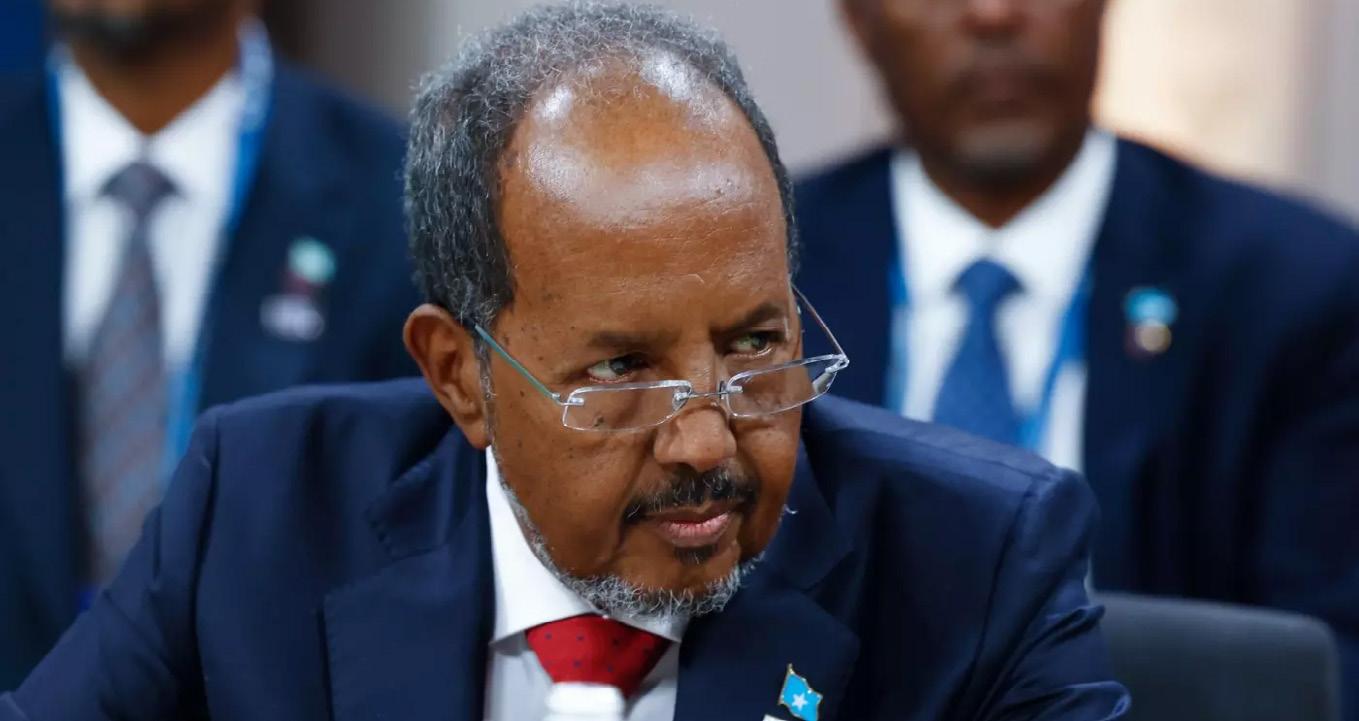
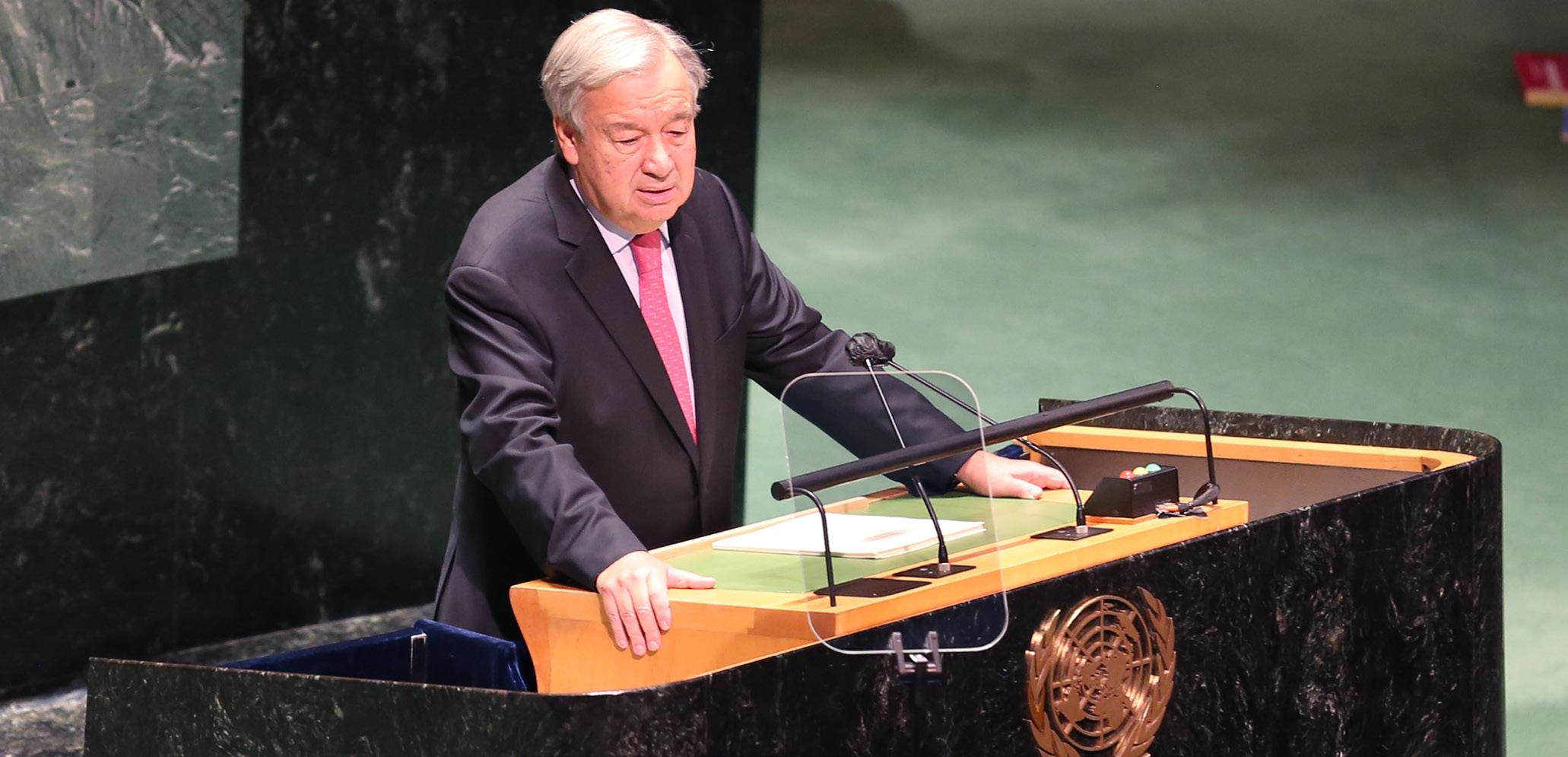
overcome the current situation,” he said. Article 33 of the UN Charter provides a wide array of measures for settlement of disputes, including negotiation, mediation, judicial and other peaceful means.
Likewise, the AU Constitutive Act in Article 3 (i) and (k) espouses the use of international negotiation and cooperation in all endeavours to raise the living standards of African peoples. There is now a serious need for bilateral negotiations, mediation and the deployment of regional agencies as possible diplomatic avenues to de-escalate and resolve the dispute between Ethiopia and Somalia.
As indicated in the AU’s Constitutive Act and the UN Charter, negotiations encompass dialogue between two parties with the endgame of finding an acceptable agreement.
Negotiation as a strategy of dispute resolution avails both parties the opportunities to build consensus to pursue their interests within the defined framework of international cooperation, security and stability. In the event, if both parties are unable to deploy negotiation by pursuing undiplomatic measures the two countries risk crippling their economic progress and losing their reputation in the global arena, particularly Ethiopia.
If bilateral negotiations hit a diplomatic stalemate, with neither party interested in cooperating, neighbouring countries or
multilateral agencies in the region may intervene to catalyse talks between Ethiopia and Somalia. Multilateral negotiations refer to a dialogue process involving multiple stakeholders facilitated by international actors or forums.
Multilateral negotiations often are characterised by the option of the facilitator recommending a mediator’s proposal to the parties if the parties are unable or unwilling to reach mutual consensus. In the case of Ethiopia and Somalia, neighbouring countries, the Inter-Governmental Authority on Development (IGAD), the AU and the UN can be the interlocutors that can accelerate the negotiation process. They can, where possible, draft a proposal for the parties to consider.
In the case of mediation, it is facilitated by a third party. This is often pursued when negotiations between the involved parties have collapsed because of various reasons. In the context of the dispute between Somalia and Ethiopia, the IGAD Mediation Unit and/or AU mediation architectures are noteworthy entities to provide interlocutory services to the parties concerned.
Kenya has been at the forefront of recent attempts to mediate in conflicts in the region, led by General (Ret) Lazarus Sumbeiyo and diplomats such as Stephen Kalonzo Musyoka. Indeed, the Kenyan government has historically hosted and mediated in conflicts within the region, including the talks that led to the cessation
of hostilities and formation of Somalia’s transitional government.
It is currently involved in the ongoing political arguments in South Sudan between the government and various stakeholders as the country moves slowly to holding its first elections in December since independence in 2011.
Mediation is an effective dispute resolution mechanism if well deployed. Under Article 33 of the UN Charter, Somalia and Ethiopia are obliged to pursue mediation. Moreover, the AU’s policy on Silencing the Guns by 2030 also encourages mediation as a forum for dispute resolution.
In the case of Ethiopia and Somalia, the AU could deploy either mediation or fact-finding to facilitate a peaceful dispute resolution. In the past, the AU has deployed the two mechanisms successfully.
However, the suitability and appropriateness of these mechanisms will depend on the willingness of Somalia and Ethiopia to resolve the dispute in good faith and trust. The ball lies in the courts of both countries.
It is paramount that the dispute between is addressed urgently through diplomatic avenues, as suggested by Guterres. Otherwise, failure to resolve it would escalate the situation, leading to political instability and humanitarian catastrophe within the two states as well as the Horn of Africa region.
A recent report by the World Travel and Tourism Council paints a promising future of Africa's tourism sector, projected to grow at 5.1 percent annually between 2023 and 2033, driven by key players like Madagascar, Libya, and Mauritius. Jon Offei-Ansah read the report
AFRICA’S Travel & Tourism sector is set for a remarkable transformation over the next decade. According to a recent report by the World Travel and Tourism Council (WTTC), the sector's contribution to the continent's economy is expected to grow at an annual rate of 5.1 percent between 2023 and 2033, significantly outpacing the 3.1 percent forecasted annual growth rate for the overall African economy. This growth positions Africa as a leading region in tourism development, second only to the Asia-Pacific region. The sector is also expected to create 12.7 million jobs, playing a crucial role in reducing unemployment and improving living standards across the continent.
The anticipated growth in Africa's Travel & Tourism sector will have a profound impact on the continent's economy. By 2033, the sector's contribution to the economy is expected to be substantial, driven by increased tourist arrivals and spending. This growth will not only boost economic output but also create millions of jobs, contributing to the overall development of the continent. The sector's ability to generate significant employment opportunities will be instrumental in addressing the high unemployment rates in many African countries.
Among African nations, Madagascar is forecasted to experience the most significant growth in its tourism sector, with an annualised growth rate of 9.9 percent. This growth is attributed to the island nation's unique biodiversity, pristine beaches, and rich cultural heritage, which continue to attract an increasing number of international tourists. Madagascar's strategic efforts to promote sustainable tourism and conservation have also played a key role in its tourism sector's robust growth.

Libya, despite its political challenges, is expected to see an annual growth rate of 8.9 percent in its tourism sector.
The country's rich history, including ancient Roman ruins and Mediterranean coastline, offers substantial potential for tourism development. With improved political stability and security, Libya's tourism sector could become a significant contributor to its economy.
Mauritius, known for its luxury resorts and beautiful beaches, is projected to grow its tourism sector by 8.6 percent annually. The country's strategic marketing efforts and high-quality tourism infrastructure make it a leading destination in the region. Mauritius has successfully positioned itself as a premier destination for honeymooners, luxury travellers, and eco-tourists, contributing to its strong tourism growth.
Countries with already significant Travel & Tourism sectors, such as Egypt and Morocco, are also set to experience robust growth. Egypt's tourism sector is projected to grow at an annual rate of 5.3 percent, driven by its iconic historical sites like the Pyramids of Giza and the Sphinx,
as well as new investments in tourism infrastructure. Egypt has been actively promoting its rich cultural heritage and archaeological sites to attract more tourists.
Morocco, with its vibrant cities, stunning landscapes, and rich cultural heritage, is also forecasted to grow its tourism sector by 5.3 percent annually.
The country's strategic location and welldeveloped tourism infrastructure make it a popular destination for both leisure and business travellers. Morocco's diverse attractions, from the bustling markets of Marrakech to the serene deserts, continue to draw tourists from around the world.
Kenya and South Africa, two of Africa's most established tourism markets, are expected to grow their tourism sectors by 5.2 percent and 4.1 percent respectively. Kenya's diverse wildlife and national parks, along with its stunning coastline, continue to attract tourists from around the world. South Africa, known for its cultural diversity, natural beauty, and vibrant cities, remains a key player in the continent's tourism industry.
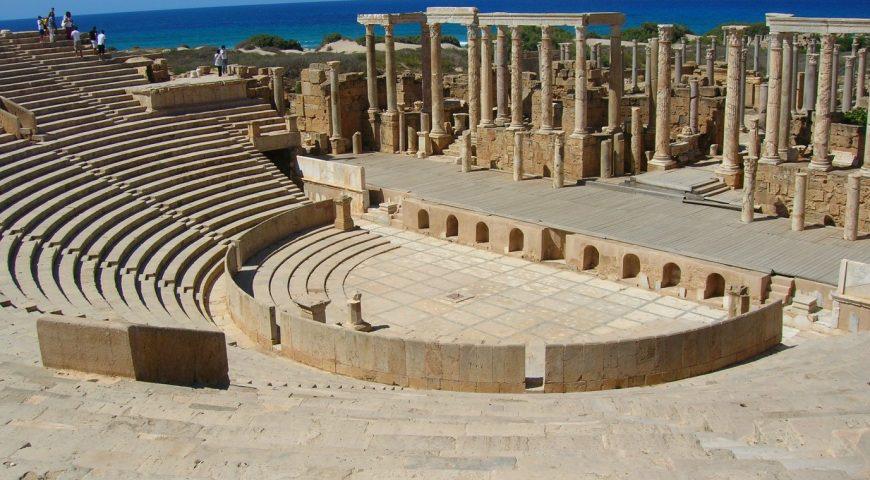
Several factors are driving the growth of Africa's Travel & Tourism sector.
Improved infrastructure: Investments in airports, roads, and hospitality infrastructure are enhancing the tourism experience and making travel more accessible. Improved infrastructure is critical for connecting tourists to various destinations within the continent.
Government initiatives: Many African governments are prioritising tourism as a key economic sector and are implementing policies to attract more tourists and investment. These initiatives include visa reforms, tax incentives, and investment in tourism marketing.
Marketing and promotion: Strategic marketing campaigns are raising awareness of Africa's diverse attractions, from wildlife safaris to cultural festivals and historical sites. Countries are leveraging digital marketing and social media to reach a global audience.
Increased connectivity: Improved air connectivity, with more direct flights to and from Africa, is making it easier for tourists to visit the continent. Airlines are expanding their routes and partnerships to offer more convenient travel options.
Sustainable tourism: There is a growing emphasis on sustainable tourism practices that protect the environment and benefit local communities, making Africa an attractive destination for eco-conscious travellers. Initiatives such as communitybased tourism and conservation projects are gaining traction.
While the growth projections for Africa's Travel & Tourism sector are promising, there are challenges that need to be addressed to fully realise this potential.
These include:
Political stability: Political instability in some countries can deter tourists and investors. Ensuring stability and security is crucial for the growth of the tourism sector. Governments must work towards maintaining peace and addressing any potential conflicts.
Health and safety: The Covid-19 pandemic has highlighted the importance of health and safety measures in the tourism industry. Ensuring that health protocols are in place and adhered to will be vital for rebuilding tourist confidence. Countries must invest in healthcare infrastructure and emergency response systems.
Visa policies: Simplifying visa processes and improving access for international tourists can significantly boost tourist arrivals. Streamlined visa procedures and e-visa systems can enhance the overall travel experience.
Capacity building: Investing in the training and development of tourism professionals is essential to provide high-quality services and enhance the visitor experience. Tourism education and vocational training programmes can equip the workforce with the necessary skills.
Despite these challenges, the opportunities for growth in Africa's tourism sector are immense. By leveraging its unique attractions, improving infrastructure, and implementing supportive policies, Africa can position itself as a leading global tourism destination.
Africa's Travel & Tourism sector is poised for significant growth over the next decade, with its contribution to the
economy expected to outpace overall economic growth. Key countries like Madagascar, Libya, and Mauritius are leading the way with impressive growth projections, while established markets like Egypt, Morocco, Kenya, and South Africa continue to thrive. This growth will not only boost economic output but also create millions of jobs, contributing to the overall development of the continent. By addressing challenges and capitalising on opportunities, Africa can ensure that its tourism sector becomes a major driver of economic prosperity.
For stakeholders in the tourism industry, including governments, investors, and tourism operators, now is the time to invest in Africa's burgeoning tourism sector. With the right strategies and investments, Africa can unlock its full tourism potential and create a sustainable, inclusive, and prosperous future for its people. Collaborative efforts between public and private sectors, along with international partnerships, will be crucial in realising this vision.
The future of Africa's tourism sector looks bright, with the potential to transform the continent's economic landscape. The sector's growth will have a ripple effect on other industries, such as hospitality, transportation, and retail, creating a multiplier effect on the economy. As Africa continues to develop its tourism infrastructure and enhance its offerings, it will attract a diverse range of tourists, from adventure seekers to cultural enthusiasts and business travellers.
Sustainability will play a vital role in the future of Africa's tourism sector. By promoting responsible tourism practices and conserving natural resources, African countries can ensure that their tourism growth is sustainable and benefits local communities. Initiatives such as wildlife conservation, eco-tourism, and community-based tourism will contribute to the long-term success of the sector.
Africa's Travel & Tourism sector is set to experience significant growth over the next decade, driven by strong economic contributions and job creation. With strategic investments, supportive policies, and a focus on sustainability, Africa can position itself as a premier global tourism destination. The continent's rich cultural heritage, diverse landscapes, and unique attractions offer immense potential for tourism development. By addressing challenges and leveraging opportunities, Africa can ensure a prosperous future for its tourism sector and its people.
Angela Cobbinah speaks to the internationally acclaimed Ghanaian artist Ablade Glover, who is still going strong at 90 with a new exhibition in London
HE is one of Ghana’s most celebrated artists whose work graces the likes of Chicago’s O’Hare International Airport and the Unesco building in Paris. But Ablade Glover never intended to become a painter when he left school in the 1950s and he only discovered he had a talent with the brush by chance.
“In those days, education in Ghana was a No.1 priority and I wanted to take advantage of the free teacher training that was on offer,” he recalls.
“Part of the course required attending art classes and one of my teachers kept telling me how good my paintings were. That’s when I began thinking of myself as an artist and after a stint working as a general teacher I decided to retrain as an art teacher at Kumasi College of Technology [now Kwame Nkrumah University of Science and Technology].”
A series of fortuitous events saw him study art abroad in between teaching but he did not have his first big exhibition until 1982, by which time the grey hairs were beginning to sprout on his head. This was at the October Gallery in London which had opened a couple of years previously with the mission to showcase art rarely shown in Europe.
The show proved a turning point for Glover, whose exuberant canvasses celebrate the daily spectacle of African life via his signature thick palette-knife strokes and rich oil colours. Still going strong at 90, he is now back in the UK for his tenth solo outing at the October Gallery, testament to the special relationship between the two.
Opened in early July by V&A East director Gus Casely-Hayford, Inner Worlds, Outer Journeys is a display of new works portraying a dizzying array of markets and bus parks, townscapes and endless crowds, be they of people or trees. Large in scale and brimming with energy, their apparent abstraction invites you to take a closer look and it is then that the picture begins to take shape.

“People say my work is abstract but for me it is a reality – I paint what is around me,” Glover tells me looking relaxed and remarkably young as we meet in the gallery’s pretty light-filled courtyard.
“What fascinates me is what I call ‘bassa bassa’ – meaning unplanned, unstructured, disorderly. Nobody queues in Ghana, whether it is in the market place, tro-tro park [bus station] or bank. But in that bassa bassa there is order, there is beauty, and that is what I’m looking for. It has always fascinated me and I’m still looking for it.”
It is no surprise to learn that he spent his early years amid the hustle and bustle of Salaga market in downtown Accra, where his mother sold food produce, before moving a few miles along the beach to La, better known as Labadi. Poor and unable to continue his education, he
had the good luck of coming of age at a time when Kwame Nkrumah took the reins of self-government in the run up to independence and launched a number of training and development initiatives.
But as Glover talks about the trajectory of his artistic journey in his quiet, unassuming way, it seems he’s also had the knack of always being in the right place at the right time. First off, a visiting textile specialist from London’s Central School of Arts and Crafts, now Central St Martins, spotted his work during teaching training, at the time simple figurative gouaches, and encouraged him to sit its entrance exam. “To my surprise I was accepted on to the textile design course but, as I had no money, I could not take it up.”
Lady fortune waved her magic wand again with a newspaper ad by the Tema Development Corporation looking to train
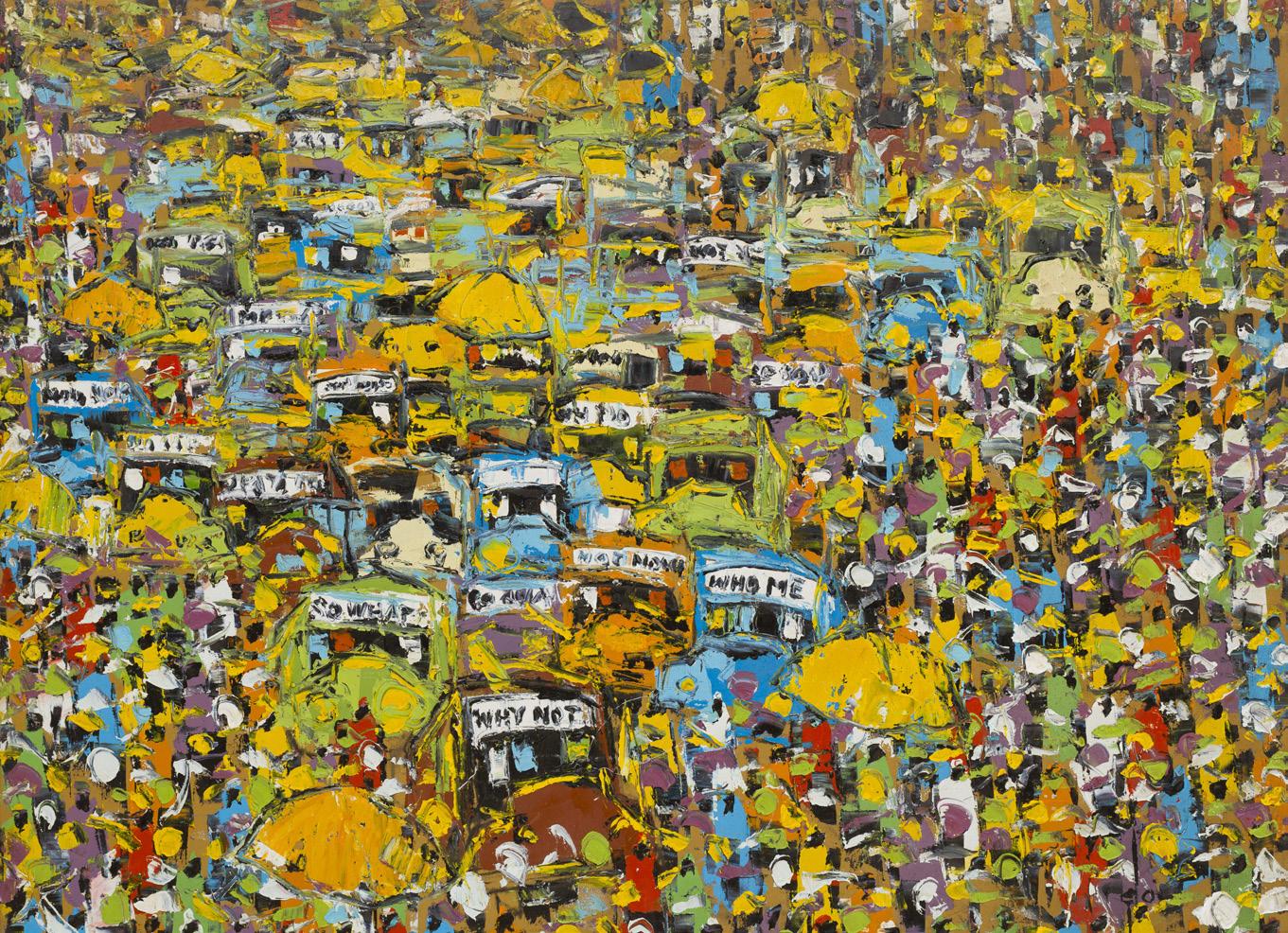
youngsters with an art background in preparation for a planned textile factory. “I applied and when I told the interviewer I had already been offered a place at Central I was given a scholarship.”
Glover spent three successful years in London returning to Ghana only to find that the factory had not yet been built. He got a teaching job at Winneba Technical College for a year, then another at the Ghana Information Service where he worked on building a prototype model of the Akosombo Dam, one of Nkrumah’s most ambitious infrastructure projects.
In the meantime, he was painting in earnest, dreaming of returning to the UK to take a course in art education at Newcastle University. Knowing that he would not be eligible for a second scholarship, he hoped to raise money from sales of his work at an exhibition he was organising at the Art Centre in Accra. Getting the right person to open it would make all the difference to not only how many people turned up but who. Much to his surprise, the head of Ghana broadcasting, Shirley Graham Du Bois, wife of the late pan-Africanist and scholar WEB Dubois, agreed to do so and the launch was a great success.
“In fact she became the first person to purchase one of my paintings and also offered me a job, but I still wanted to get back to England, though she couldn’t
understand why,” Glover recalls smiling. A few days later he was summoned to her home and told that “Osagyefo”, President, Kwame Nkrumah, wanted to see him there and then at Flagstaff House, the seat of government. “Why, I didn’t know and I felt scared as it was a very hot time politically. But he was very nice indeed and I walked out of there with a scholarship from the presidency. Within a week I was in Newcastle.”
Newcastle is memorable for a little miracle that took place during a teaching practice placement at a secondary school. “A teacher was observing me painting and advised me to use a palette knife rather
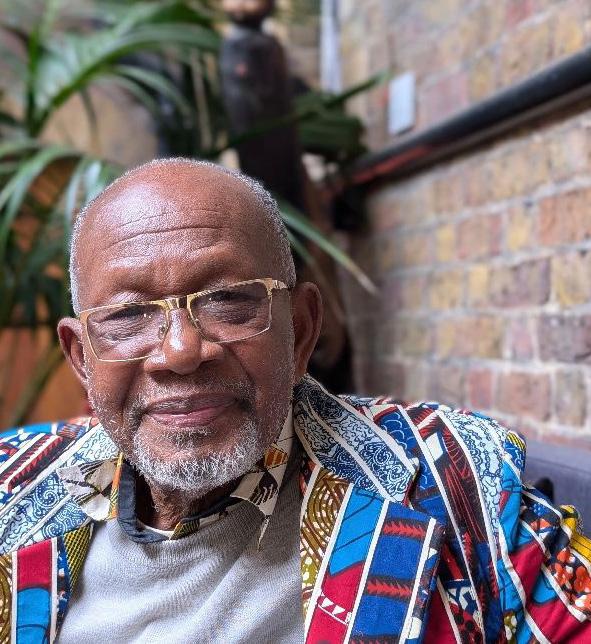
than a paintbrush. So I took up the knife and almost immediately I could feel it was part of me. It transformed my whole approach to painting and and I’ve never looked back.”
Returning to Ghana in 1965, he taught fabric design and printing at Kwame Nkrumah University of Science and Technology for seven years before going off to Kent University in the States to do a masters and, in 1974, a PhD at Ohio State University. Then it was back to teaching, at the College of Art at the University of Kumasi, for 20 years, becoming department head and finally dean.
“Throughout, painting remained my passion and I became prolific because the palette is fast. Accra was being built up rapidly and I painted a lot of buildings and people working on them, some figures and a few market women, though my market scenes were not that developed.”
There came a few small shows at the Art Centre and in Lagos, but, given the dearth of gallery space in his corner of Africa, his public visibility was limited. Then in 1982 following a chance encounter with a British Council official, he was given the opportunity of exhibiting in the UK – at the Africa Centre in London. The October Gallery, a one-time Victorian schoolhouse still in the process of being refurbished, was to be the next stop.
Ramshackle as the building was at the time, for Glover it ”was beautiful, it was home. This where I wanted my work to be. I was at the beginning but felt very encouraged because people seemed to like my work.”
From that point his work developed in leaps and bounds and by his own account, even as the acknowledged master of the palette knife and oil paint, is continuing to do so. ”I am becoming braver, more confident,” he declares as if he were just starting over again. “Now I don’t care what anybody says and if it is not correct I just scrape it off. I get what I want to get.”
But the other side of his career has been as an educator developing artistic talent. Mindful of his difficulties in finding a space to exhibit his work as a young man, Glover spent years raising money to build his own gallery. Opened by former UN chief Kofi Annan in 2008, the Artistic Alliance Gallery in Accra is now helping a new generation of artists in Ghana make their mark.
Inner Worlds, Outer Journeys: Ablade Glover at 90 runs until August 3 at the October Gallery, 24 Old Gloucester Street, London WC1N 3AL, 12:30-17:30 pm, Tues-Sat
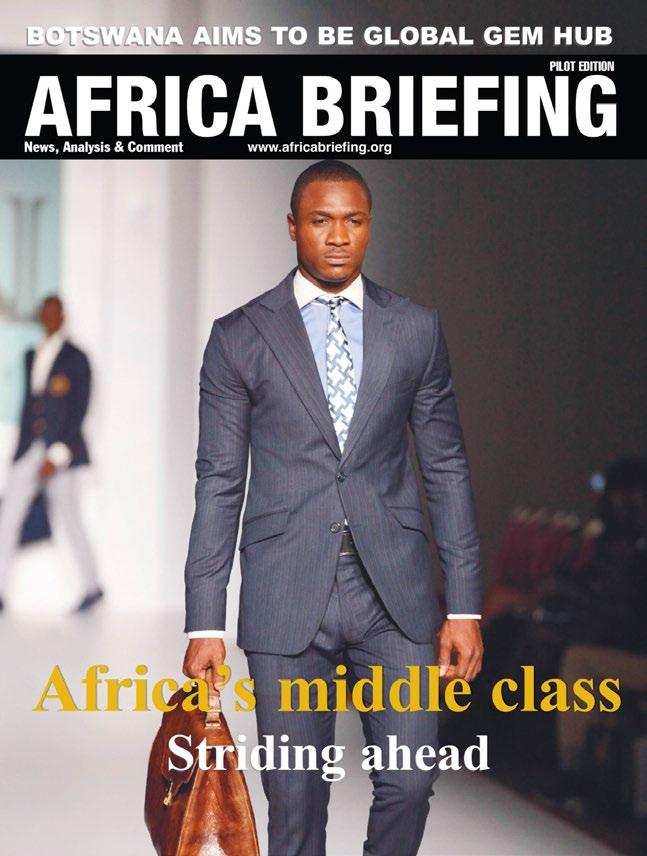
For in-depth analysis on developments in a fast-changing continent
Testimonials from some of our online subscribers:
We wish to compliment the Africa Briefing Magazine for its insight and value added stories from the Last Frontier. From a Scandanavian view the quality of material presented on time gives us the edge for investment and business purposes. Keep up the good work. Jon Marius Hoensi MD Marex Group, Norway.
I write in conjunction with JIC Holdings and its CEO, Mark Anthony Johnson, to commend Africa Briefing on its coverage of the important political, economic and social news and events in Africa. Its coverage of a wide range of topics is very impressive. I look forward to future editions. David W Gouldman, Consultant, JIC Holdings, United Kingdom.
News, analysis and forecast
Africa Briefing is an interesting new project. The publication helps fill the gap in business and economyfocused African journalism. Africa Briefing combines a good news sense with crisp copy to the reader rapid immersion into what is important in economies across the continent. James Schneider, Editorial Director, New African Magazine, London, UK
2 Redruth Close, London N22 8RN, United Kingdom
Phone: +44 (0) 208 888
